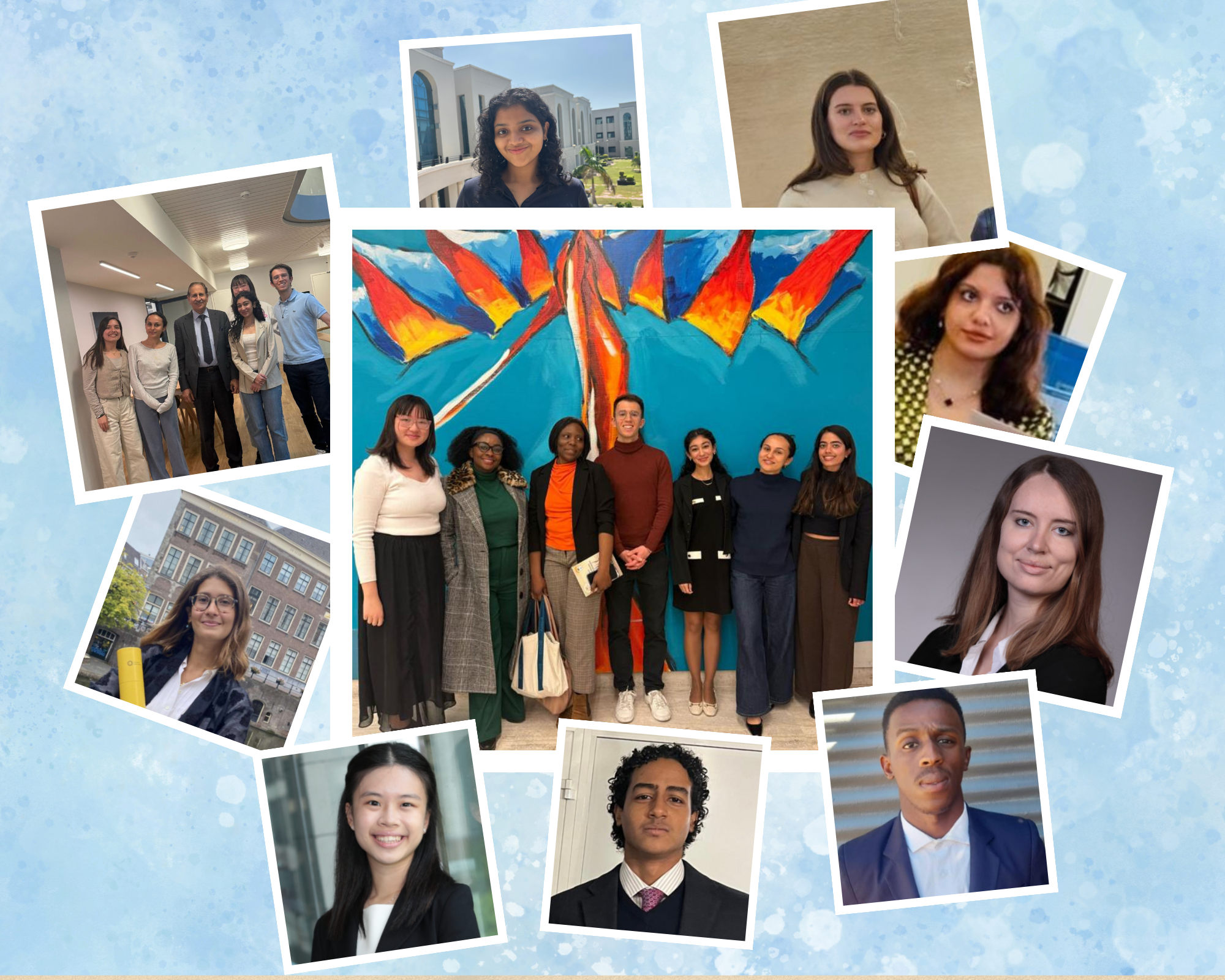Introduction
The 58th session of the UN Human Rights Council was held from 24 February to 4 April 2025 at the Palais des Nations in Geneva, Switzerland. During the six weeks, the Council reiterated its mandate to promote and protect human rights globally. Overall, the council held 5 panel discussions, 21 interactive dialogues (including Joint and Enhanced Interactive Dialogue), 13 Universal Periodic Review Outcomes and other discussions, for a total of 59 meetings. The council additionally adopted 32 new resolutions and appointed three new mandate holders.
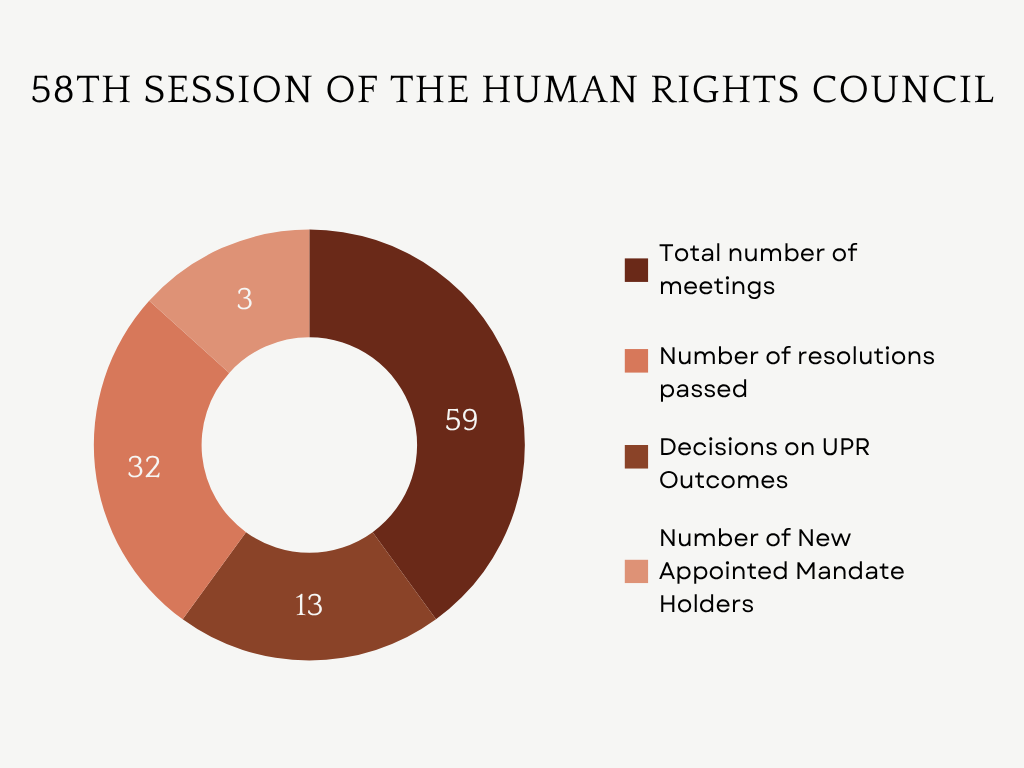
The Council held meetings on pressing human rights situations and followed up on the mandated reports by groups of experts and special rapporteurs. Of special attention were the situations taking place in Ukraine, South Sudan, the Democratic Republic of Congo, the State of Palestine, and Myanmar.
Geneva International Centre for Justice (GICJ) participated actively in the 58th session of the Human Rights Council. In collaboration with other NGOs, such as the International Organization for the Elimination of All Forms of Racial Discrimination (EAFORD), Meezaan Center for Human Rights, Association Ma’onah for Human Rights, and Immigration and International-lawyers.Org, our members delivered 11 joint oral statements. Additionally, GICJ submitted three written statements to the OHCHR. GICJ also followed many of the meetings and produced 25 reports on them.
GICJ reaffirms the essential role of civil society in the work of the Human Rights Council, recognizing it as a fundamental component in advancing human rights worldwide. Non-governmental organizations (NGOs) serve as independent monitors of governmental conduct, and their capacity to publicly denounce abuses ensures that the voices of victims are heard. Furthermore, NGOs act as representatives of individuals on the ground, advocating for the rights and interests of minorities, victims, stakeholders, local communities, workers, and other affected groups. Their informed and context-specific contributions are indispensable in developing solutions that are both effective and attuned to the needs of the populations they serve.
List of Agenda Items
The list below represents the permanent agenda items of the Human Rights Council in its 3 regular sessions. Under each item several topics are discussed in each session.
- Organizational and Procedural Matters
- Annual report of the United Nations High Commissioner for Human Rights and reports of the Office of the High Commissioner and the Secretary-General.
- Promotion and protection of all human rights, civil, political, economic, social and cultural rights, including the right to development.
- Human rights situations that require the Council’s attention.
- Human rights bodies and mechanisms.
- Universal periodic review.
- Human rights situation in Palestine and other occupied Arab territories.
- Follow-up to and implementation of the Vienna Declaration and Programme of Action.
- Racism, racial discrimination, xenophobia and related forms of intolerance: follow-up to and implementation of the Durban Declaration and Programme of Action.
- Technical assistance and capacity-building.
GICJ Participation
The collaborative nature of the GICJ team allowed participation of the interns and volunteers beyond reporting on the HRC session, as they delivered oral statements during different meetings over the course of the month. Prior to their actual participation in the session, there was active and interactive engagement through in-office training; fostering cooperation that ensured clarity, proficiency and effective participation and the delivery of each statement made. This included peer review sessions and guided feedback focused on strengthening public speaking, refining language, and ensuring alignment with organizational values and UN standards.
Photographs from these training sessions capture the energy and commitment of the interns and volunteers as they engaged in discussions, rehearsed their speeches, and provided feedback to their peers. These moments reflect the deep engagement and mentorship that defined their experience.
During the 58th Regular Session of the Human Rights Council, Geneva International Centre for Justice (GICJ) actively participated by submitting three written statements and delivering eleven joint statements on multiple topics, including on Palestine, Iraq, Syria, Yemen and other broader thematic areas such as racism, discrimination and xenophobia. GICJ also produced 25 discussion reports and co-organised a side-event on Palestine.
Here are is an infographic on GICJ's participation in HRC58:
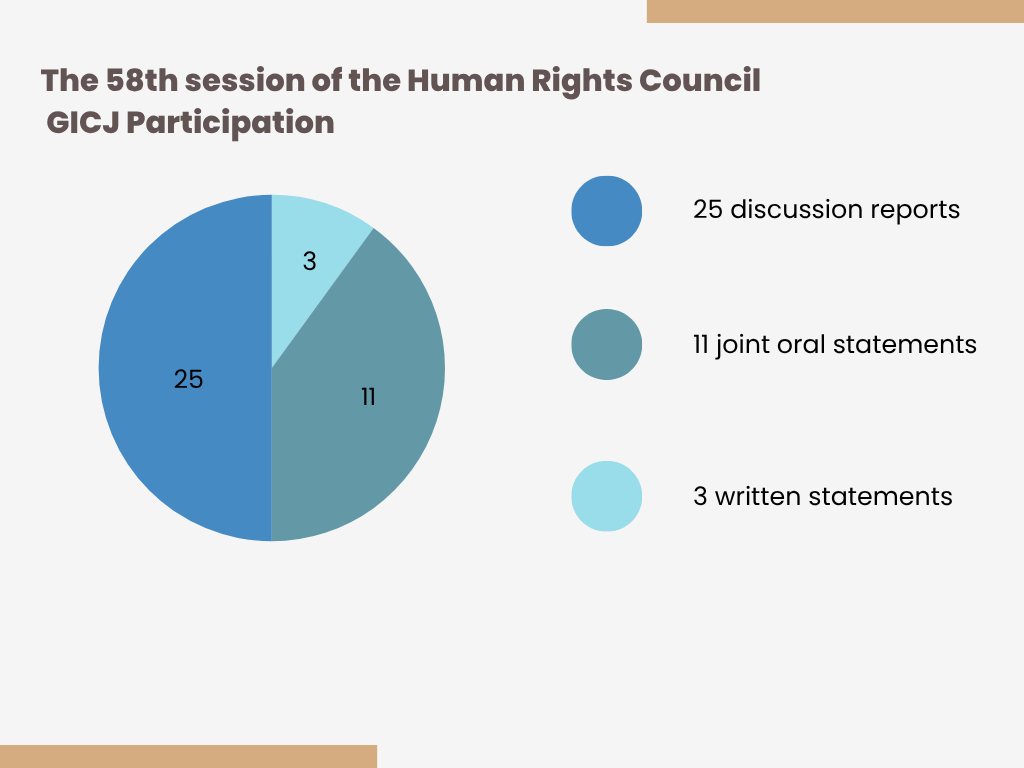
Opening statements
24 February 2025 marked the opening of the 58th session of the United Nations Human Rights Council.
During the opening, global dignitaries, ministers of foreign affairs and justice, and representatives from around the world emphasised the urgency of addressing human rights issues. They stressed the importance of enabling the Council to fulfill its mandate effectively, especially as global challenges—such as armed conflicts, climate change, and deepening poverty—continue to escalate.
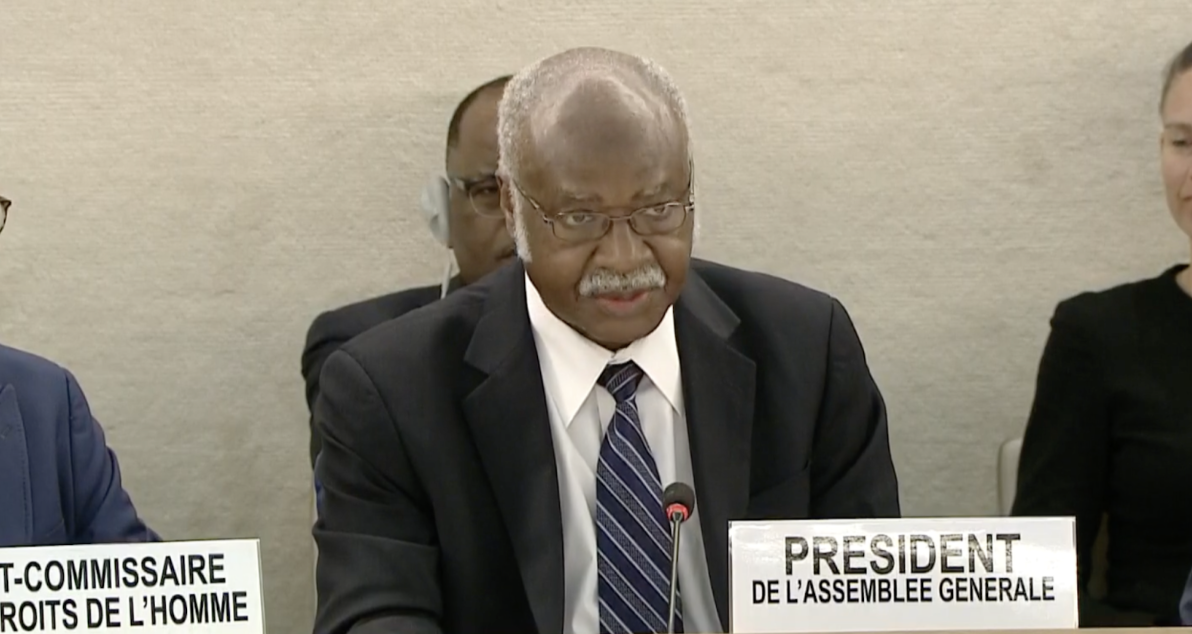
The session opened with remarks from Mr. Philémon Yang, President of the United Nations General Assembly, who stated: “Human rights are fundamental to achieving lasting peace and security and are central to the agenda for sustainable development.” He highlighted the devastating consequences of human rights violations, noting that over 300 million people now require humanitarian assistance. He also emphasised that in every conflict, women and minorities bear the heaviest burden, citing crises in Gaza, Ukraine, Sudan, Myanmar, Haiti, and the DRC as examples of regions where human rights are under severe threat.
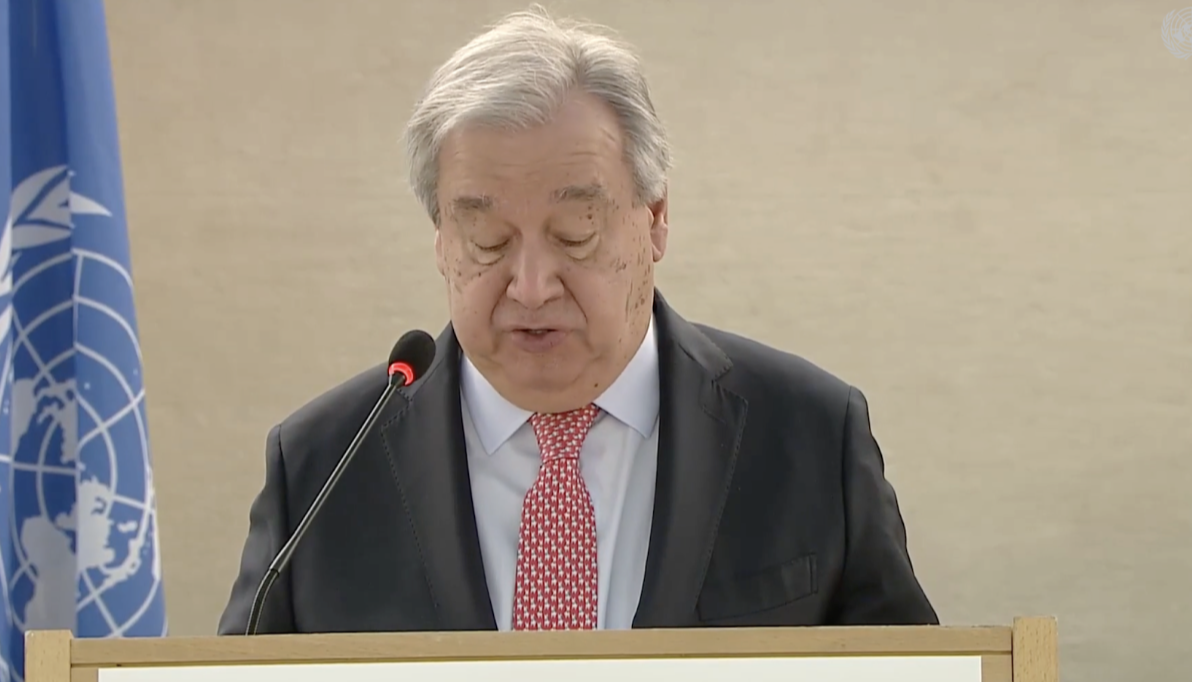
Next, Mr. António Guterres, Secretary-General of the United Nations, warned that human rights violations take a toll not only on individuals but also on fundamental principles of international law. He also reminded the assembly that 24 February 2025 marks the third anniversary of Russia's full-scale invasion of Ukraine, which has resulted in 12,600 deaths, countless injuries, and the destruction of hospitals and schools. He called for unwavering efforts to end the conflict following the principles of the UN Charter, urging collaboration between governments, civil society, and citizens. He referred in particular to the catastrophic situation in Gaza and the escalation of violations against the Palestinian people in the West Bank by the occupation forces and settlers, stressing the need to end the occupation.
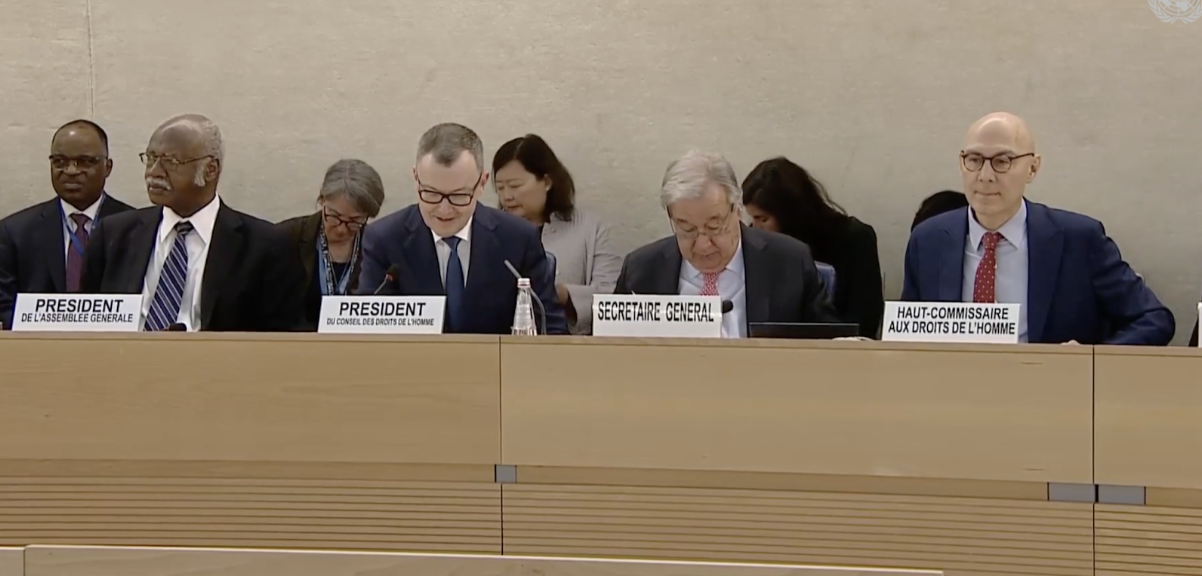
Finally, Mr. Volker Türk, United Nations High Commissioner for Human Rights, stressed that human rights have never been under so much strain. He mentioned the war in Ukraine and in Gaza as well as conflicts in Sudan, Myanmar, Afghanistan, and beyond as examples of breaking points for the human rights edifice. Similarly, he identified social tensions, environmental catastrophes, technological misuse and manipulation as phenomena that are worsening human rights, in particular for the most vulnerable ones. The High Commissioner thus called for a system of politics of “wisdom and compassion” to replace the mischievous game of double standards and widespread assaults on human rights that characterises the current international landscape. The High Commissioner stated clearly that “ Any sustainable solution (in Palestine) must be based on accountability, justice, the right to self-determination, and the human rights and dignity of both Israelis and Palestinians. Any suggestion of forcing people from their land is completely unacceptable.”
Oral Statements
During the 58th Session of the UN Human Rights Council, Geneva International Centre for Justice (GICJ) delivered joint 11 oral statements in collaboration with the International Organization for the Elimination of All Forms of Racial Discrimination (EAFORD), Association Ma’onah for Human Rights and Immigration, Meezaan Center for Human Rights, International Youth and Student Movement for the United Nations (ISMUN) and International-Lawyers.Org.
Transitional Justice: A crucial step for Syria
Enhanced Interactive Dialogue on Item 2 and 3: OHCHR report on transitional justice
5 March
Joint statement by Meezaan Center for Human Rights, Association Ma’onah for Human Rights and Immigration and Geneva International Centre for Justice
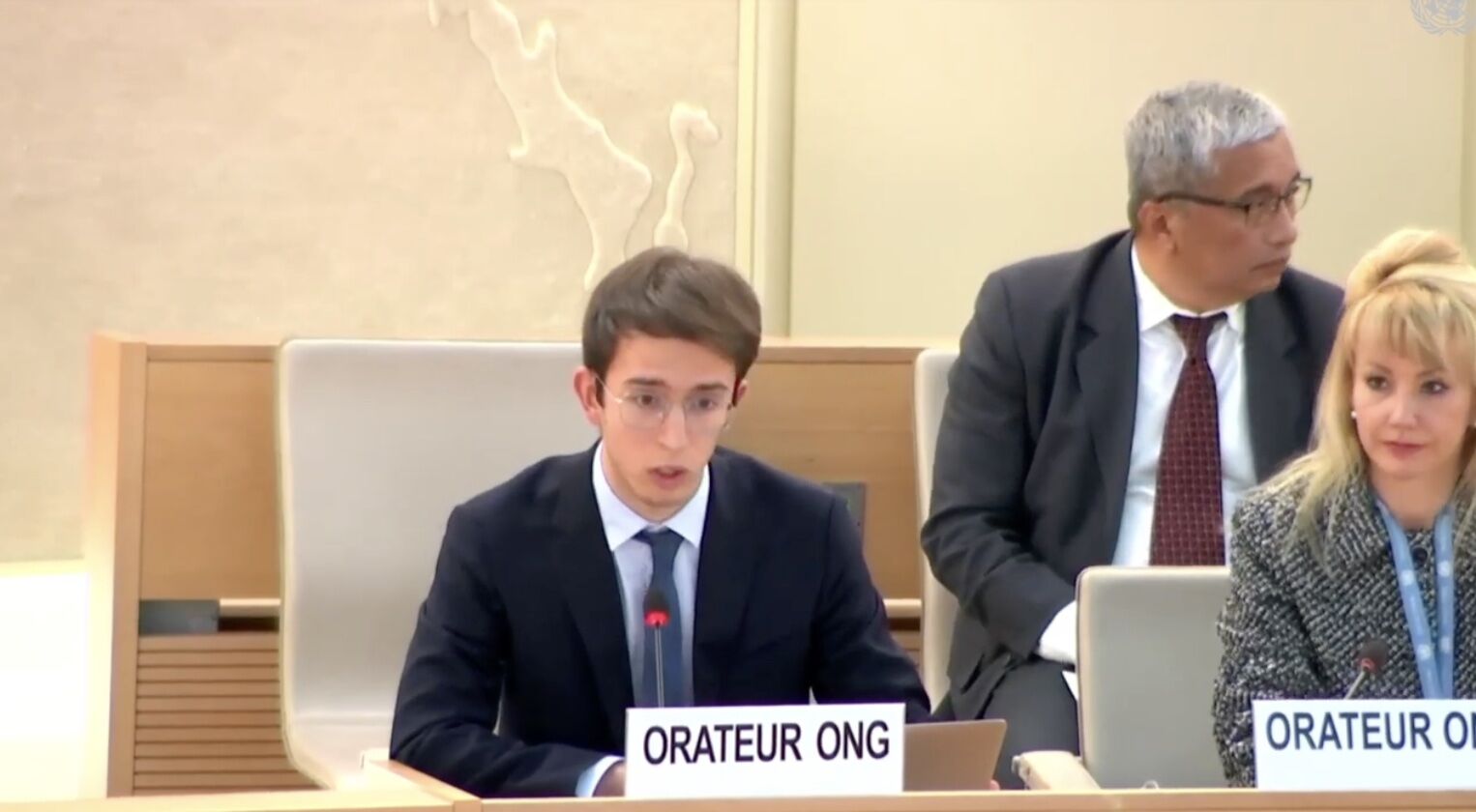
By Lorenzo Bersellini / GICJ
We welcome the report of the Office of the High Commissioner for Human Rights. In providing a wide array of good practices that have at their core the protection and reintegration of victims into society, the report gives multiple examples of how to achieve transitional justice without leaving anyone behind, considering aspects related to the promotion of accountability, memory, grass-route initiatives, victims protection and national or international mechanisms for justice.
In light of all these recommendations, we believe that the report should serve as a blueprint for the current Syrian authorities as they transition from the 53-years-long dictatorship rule which has left the country shattered in ruins and in need to heal from a profound trauma.
In order to achieve a sustainable and lasting peace, establishing an effective and truthful framework for transitional justice must be a priority for Syria’s new authorities.
Meezaan Center for Human Rights, Association Ma’onah and Geneva International Center for Justice therefore advocate for the implementation of a victim-centered mechanism to secure accountability for crimes perpetrated in Syria, the documentation and collection of evidence regarding abuses and violations and the creation of forums where victims can safely share their stories and receive adequate legal and psychological counseling. We believe that the voice of civil society and victims must be at the center of Syria’s transitional justice. Finally, it is imperative to allow the millions of Syrians who fled the country to contribute to the dialogue. We thus call upon the relevant international and regional organisations to facilitate this process.
Thank you.
22 Years Later: Taking Accountability for the Invasion of Iraq
General Debate on Agenda Item 4: Human Rights Situations that Require the Council’s Attention
20 March
Joint Statement by International-Lawyers.Org and Geneba International Centre for Justice
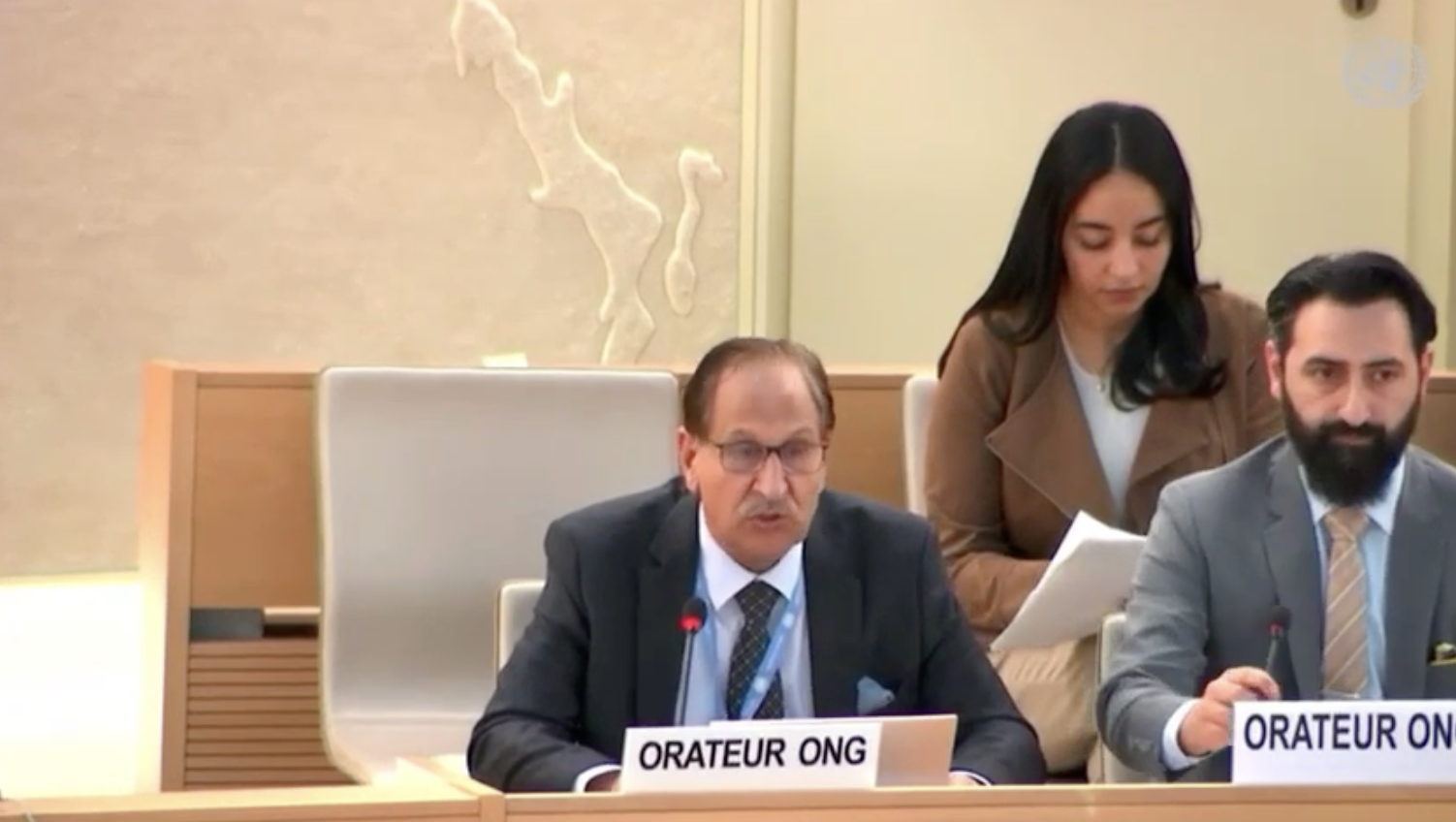
By Naji Haraj / GICJ
Today marks 22 years since the U.S.-led invasion of Iraq—a war launched under false pretenses that left behind a legacy of suffering, instability, and human rights violations. What was claimed as a mission to disarm weapons of mass destruction became a devastating occupation that tore apart Iraqi society, claimed over two million lives, and displaced millions more.
Entire cities were destroyed, leaving behind not only death but also toxic legacies of environmental damage and long-term health crises. Civilian infrastructure—schools, hospitals, water systems—was wiped out.
The same disregard for international law and human rights seen in Iraq continues to shape conflicts today, including the ongoing Genocide in Gaza.
Without accountability, history repeats itself. Perpetrators of war crimes and atrocities must face justice if we are to prevent future tragedies. We urge this Council to:
- Establish an independent tribunal to prosecute those responsible for the illegal invasion of Iraq and ongoing violations in Palestine.
- Uphold international law and ensure reparations for victims.
- Strengthen multilateral institutions to safeguard peace and human dignity.
Let us honor the victims by committing to justice, accountability, and a world where no nation acts above the law.
Thank you.
Urgent Call for Justice: Addressing the Human Rights Violations in Yemen
General Debate on Agenda Item 4: Human Rights Situations that Require the Council’s Attention
20 March
Joint Statement by Association Ma’onah for Human Rights and Immigration and Geneva International Centre for Justice
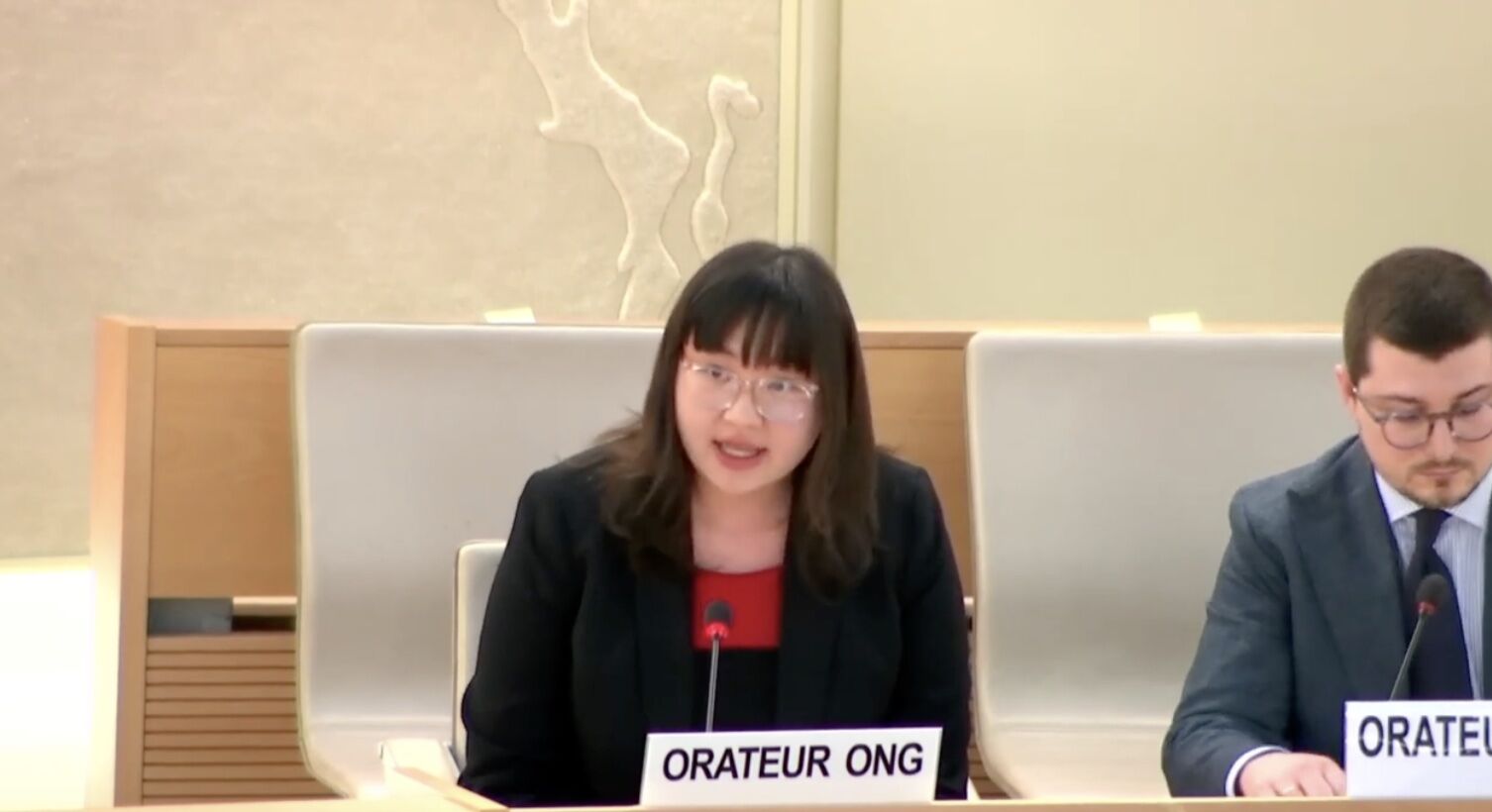
By Charlize Chen / GICJ
We stand before you today to address the grave and ongoing human rights violations in Yemen. How many more lives must be lost before the world takes action? How many more children must go hungry, and how many more families must be torn apart, before we acknowledge the full scale of this crisis?
The Houthis have carried out systematic bombings of civilian homes and religious sites and have militarized the Hodeida region’s ports. Yemen faces one of the world’s worst humanitarian crises, with over 4.5 million internally displaced people, widespread famine, and limited access to healthcare. Indiscriminate airstrikes have resulted in the deaths of thousands, including women and children. Today, more than 21 million people in Yemen, including 11.3 million children, require humanitarian aid.
Association Ma’onah and the Geneva International Centre for Justice urge the United Nations and the international community to take decisive action to end these atrocities. It is imperative to protect human rights and enhance the legal framework to ensure its effective implementation. We urge all member states to act with urgency, commitment, and moral responsibility to secure justice for the people of Yemen.
No Justice After 22 Years: Remembering the Invasion of Iraq
General Debate on Agenda Item 4: Human Rights Situations that Require the Council’s Attention
20 March
Joint Statement by International Organization for the Elimination of All Forms of Racial Discrimination (EAFORD) and Geneva International Centre for Justice
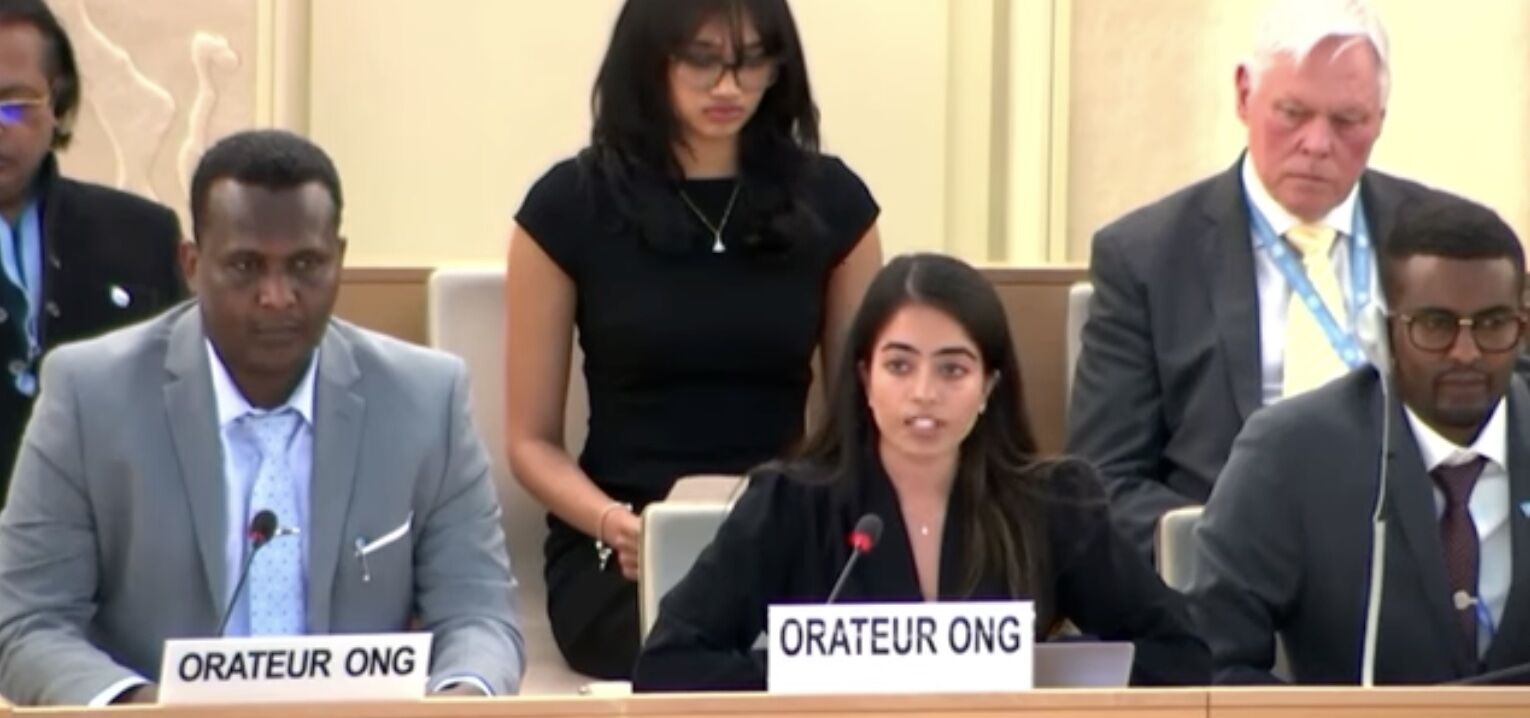
By Shyla Gheek / GICJ
Twenty-two years ago, on this very day, humanity lost its way. On March 20th, 2003, under the false pretence of liberty, The US and UK began their invasion of Iraq, a true war of aggression. 22 years later, we sit here with no true explanation, no reparations and most of all, no justice.
The weapons of mass destruction they set out to find, never existed. What did exist was an entire nation that was torn apart. Over 2 million Iraqi citizens were killed. Institutions that once gave Iraq stability, destroyed.
The ongoing patterns of displacement, arbitrary detentions, systematic use of torture and humiliation continue to be prevalent. Enforced disappearances, especially those involving children, have and continue to be left unaddressed. The campaign of Shock and Awe was in fact, shocking and awful.
What followed was remorseless destruction, violation of international law, and an unforgettable stain on human history. Since 2003, Iraq has remained engulfed in violence, instability, and sectarian conflict. The very foundation of the country and its people suffocated under the white blanket of the West.
On behalf of EAFORD and Geneva International Centre for Justice, we call for accountability for the crime of aggression, an official apology, and creation of an Independent Inquiry of all human rights violations in Iraq since 2003.
Thank you.
Targeted Innocent: Children as Victims of Genocide in Palestine
General Debate on Agenda Item 7: Human rights situation in Palestine and other occupied Arab territories
26 March
Joint Statement by Association Ma’onah for Human Rights and Immigration and Geneva International Centre for Justice
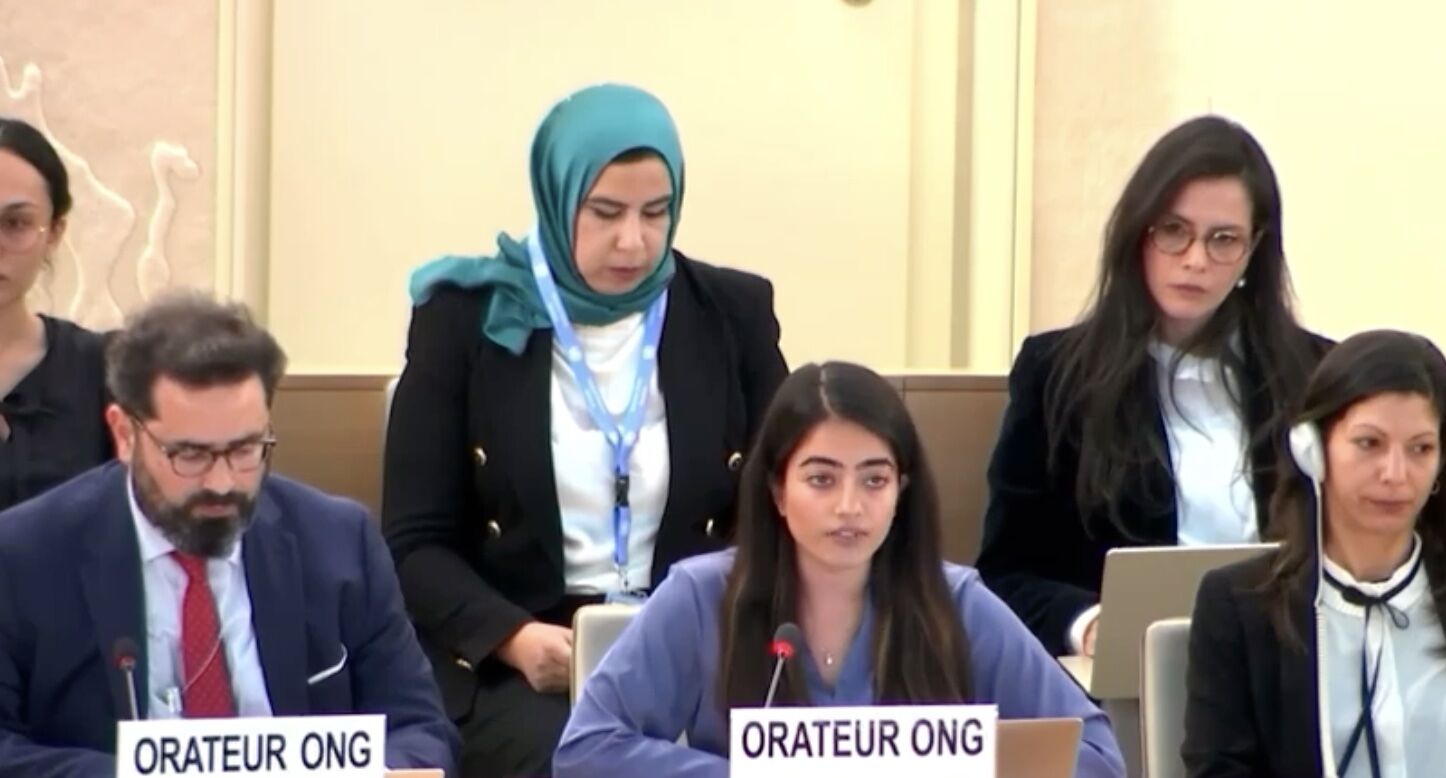
By Shyla Gheek / GICJ
When this session began, Gaza was clinging to a fragile ceasefire. Yet within days that illusion of moving forward, of peace, was shattered. In a single night at least 174 children were killed. In one night. One of the highest single-day child death tolls in modern history.
Since October 7th 2023 over 16,000 children have been killed, more than a million have been displaced and thousands remain lost. Children are not just casualties of this war, they are its deliberate targets. We need to recognize the genocidal nature of this man-made humanitarian crisis, a moral crisis, a crisis in which the international community has failed to uphold the most basic principles of human dignity and international law.
The war on Gaza has been called many things but what it is at its core, a war on children, a war on the future of the Palestinian population. Schools lay in ruins. Hospitals reduced to dust. Weaponization of starvation. Declaration of famine acute malnutrition, and many more violations, that are constantly buried beneath the bombed land, that is now left unrecognizable under the weight of violence and destruction.
On behalf of Ma’onah and Geneva International Centre for Justice, we demand accountability for the crimes committed, bring an end to the war, justice for the lives lost, and protection of all Palestinian people, especially women, children and all other civilians.
Thank you.
Gaza’s Humanitarian Crisis Demands Action — 1 Million Children at Risk
General Debate on Agenda Item 7: Human rights situation in Palestine and other occupied Arab territories
26 March
Joint tatement by Meezaan Center for Human Rights and Geneva International Centre for Justice
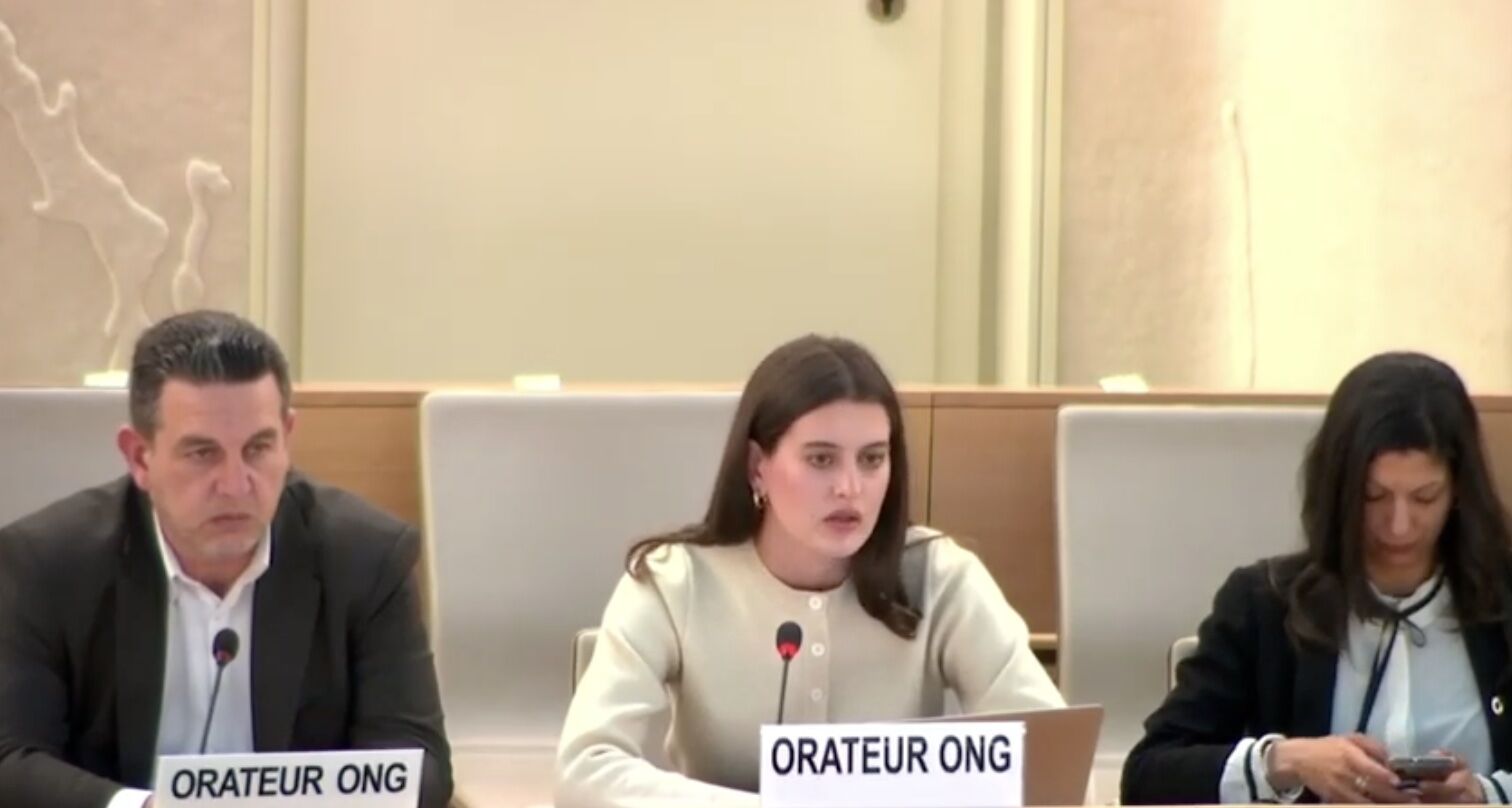
By Sofya Losikova / GICJ
The dire humanitarian situation in Gaza requires immediate and urgent international action. Since Israeli authorities halted the entry of humanitarian aid, including fuel, into the Gaza Strip on the 2nd of March, the region has been left without essential supplies. This period now exceeds the duration of the siege imposed between 7-21 October 2023. Critical supplies, including food, medical equipment, and fuel, are urgently needed.
According to UNICEF, roughly 1 million children in Gaza lack basic necessities, with about 4,000 newborns unable to access essential medical care. The health system in North Gaza has largely collapsed, with severe shortages of medical supplies. Hospitals are struggling with a lack of oxygen, essential medications, and materials needed for surgeries and other medical treatments. This has severely impacted the ability to provide life-saving services.
At least 1.9 million people, or 90% of the population, have been displaced, many multiple times. The destruction of homes and infrastructure, with 92% of homes severely damaged or destroyed, has left countless people without shelter. The situation is worsening as new evacuations are expected due to ongoing risks.
Meezaan Center for Human Rights and Geneva International Centre for Justice call for urgent attention from the international community and States to address the worsening human rights situation in Gaza. We urge the establishment of safe routes for humanitarian aid, support for international investigations, and pressure on Israel to lift the blockade and allow unrestricted aid.
Thank you.
Beyond War and Occupation: Recognizing the Genocide of Palestine
General Debate on Agenda Item 7: Human rights situation in Palestine and other occupied Arab territories
26 March
Joint Statement by the International Organization for the Elimination of All Forms of Racial Discrimination (EAFORD) and Geneva International Centre for Justice
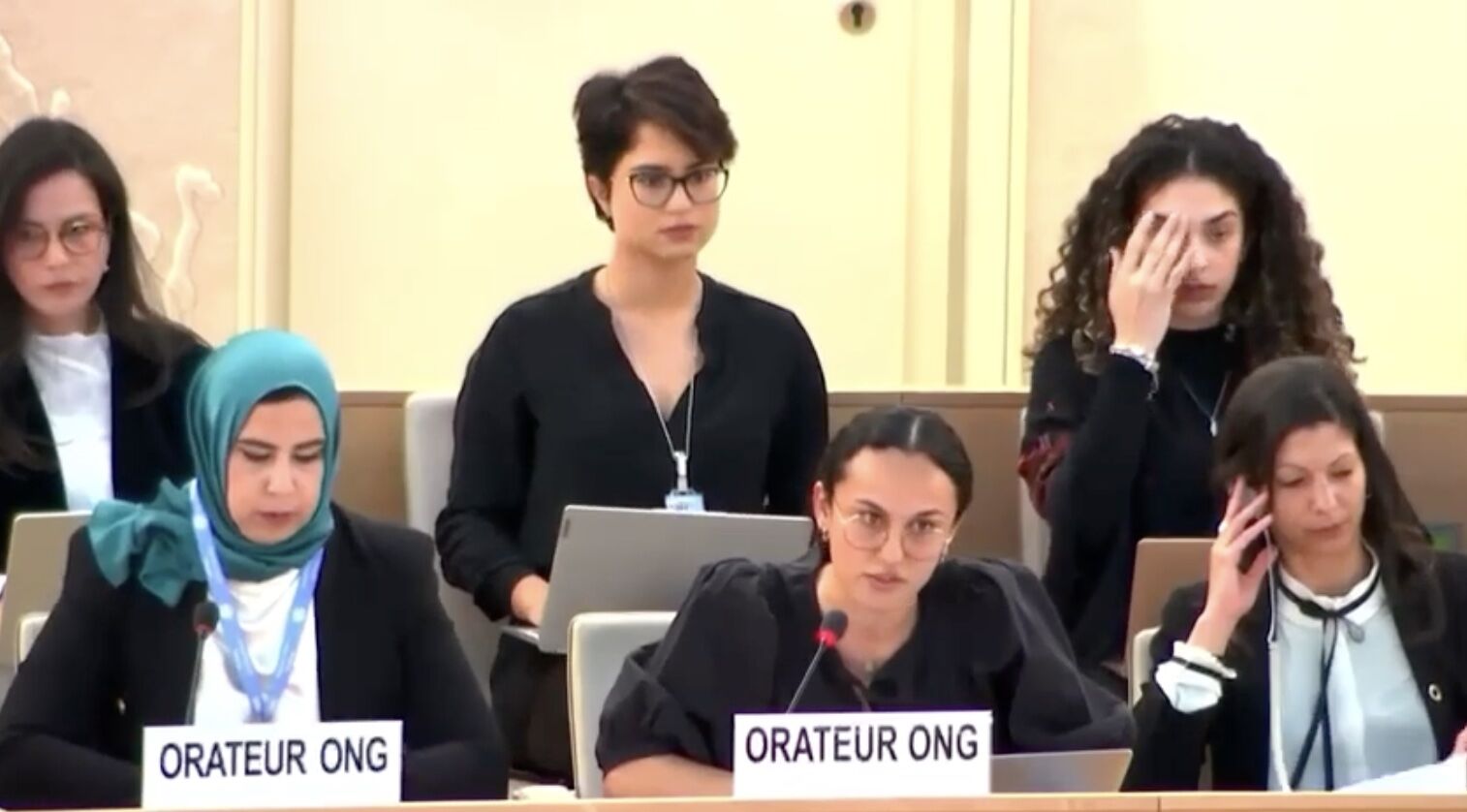
By Shrimeti Jungo / GICJ
The collapse of Gaza’s fragile ceasefire exposes a harsh truth—this is no longer a war, but a systematic eradication of the Palestinian people. At least 1.9 million Palestinians were displaced. Over 50’021 Palestinians have been killed, and more than 113’000 wounded.
The deadly Israeli attacks on the Palestinian people – including defenceless women and innocent children – are no longer just a cause for concern; they are an undeniable reality. As an occupying power, Israel’s systematic and disproportionate use of force amounts to nothing less than a genocide – a serious war crime, and a grave violation of human rights and international law.
We strongly condemn Israel’s genocidal acts, and we demand an end to Israel’s impunity—no one is above the law. Israel ratified the Genocide Convention in 1950, thus is legally obligated to prevent and punish acts of genocide.
We also condemn the involvement of other States who are complicit in the genocide of Palestinians. Under Article 3(e) of the Genocide Convention individuals, groups or States enabling genocide must be held legally accountable under international law. Finally, we urge the Council to take more decisive resolutions and bolder steps towards ending the genocide against Palestinians.
The world cannot turn a blind eye to this systematic campaign of genocide and oppression any longer.
Thank you.
Advancing Human Rights: Implementing the Vienna Declaration and Programme of Action
General Debate on Agenda Item 8: Follow-up to and implementation of the Vienna Declaration and Programme of Action
27 March
Joint statement by Association Ma’onah for Human Rights and Immigration, International Organization for the Elimination for all Forms of Racial Discrimination (EAFORD), and Geneva International Centre for Justice
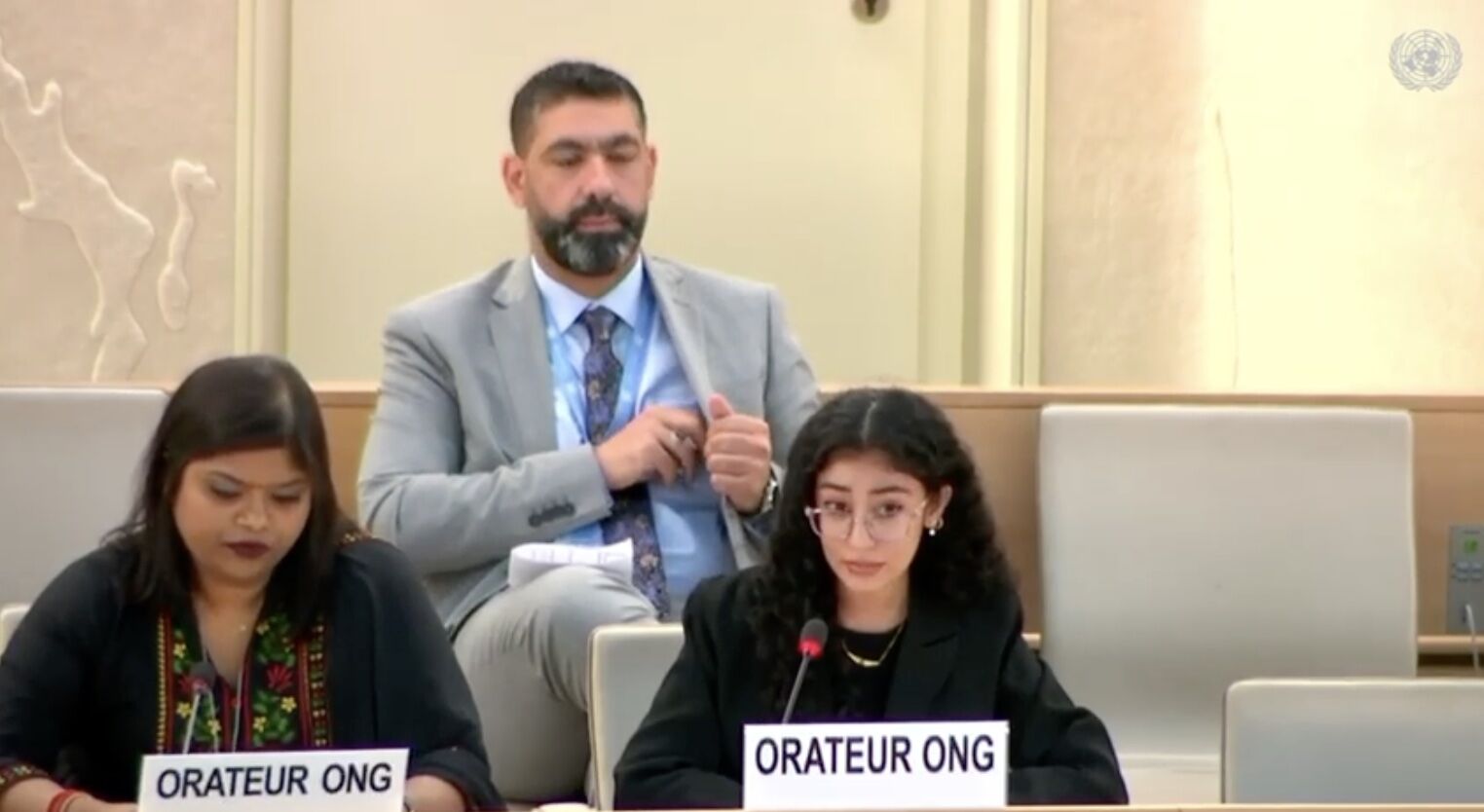
By Prishika Adhira Bhoyroo / GICJ
To this day, the Vienna Declaration and Programme of Action remains a landmark document for the sustainment and promotion of human rights on the international scale.
In a world increasingly vulnerable to the atrocities of war, geopolitical instability, climate change, and digital risks- it must be a global priority for individuals to be entitled to their fundamental human rights and freedoms without discrimination or distinction on the account of race, colour, sex, religion, or politics.
Taking into consideration that the deplorable ongoing occupation of Palestine denies Palestinian of their fundamental rights notably right to freedom, education, and movement alongside others. Action, investment, and commitment for humans to be free from crimes against humanity and the discontinuation of human rights violations are of utmost importance. We should also remind the Council of the grave human rights situation and that human rights defenders are under severe threat and intimidation in Iraq, Sudan Yemen, Afghanistan, and the Democratic Republic of Congo among others are at stake- humans are unable to grow, learn and embellish with dignity.
Ma’onah, EAFORD and Geneva International Centre for Justice calls upon the United Nations, member states, and non-governmental organisations to increase their engagement in the reduction of human rights violations and foster their cooperation to fully implement the Vienna declaration and Programme of Action.
Thank you.
Condemning Racism, Racial Discrimination, and Intolerance
General Debate on Item 9: Racism, racial discrimination, xenophobia and related forms of intolerance
27 March
Joint statement by International-Lawyers.Org and Geneva International Centre for Justice
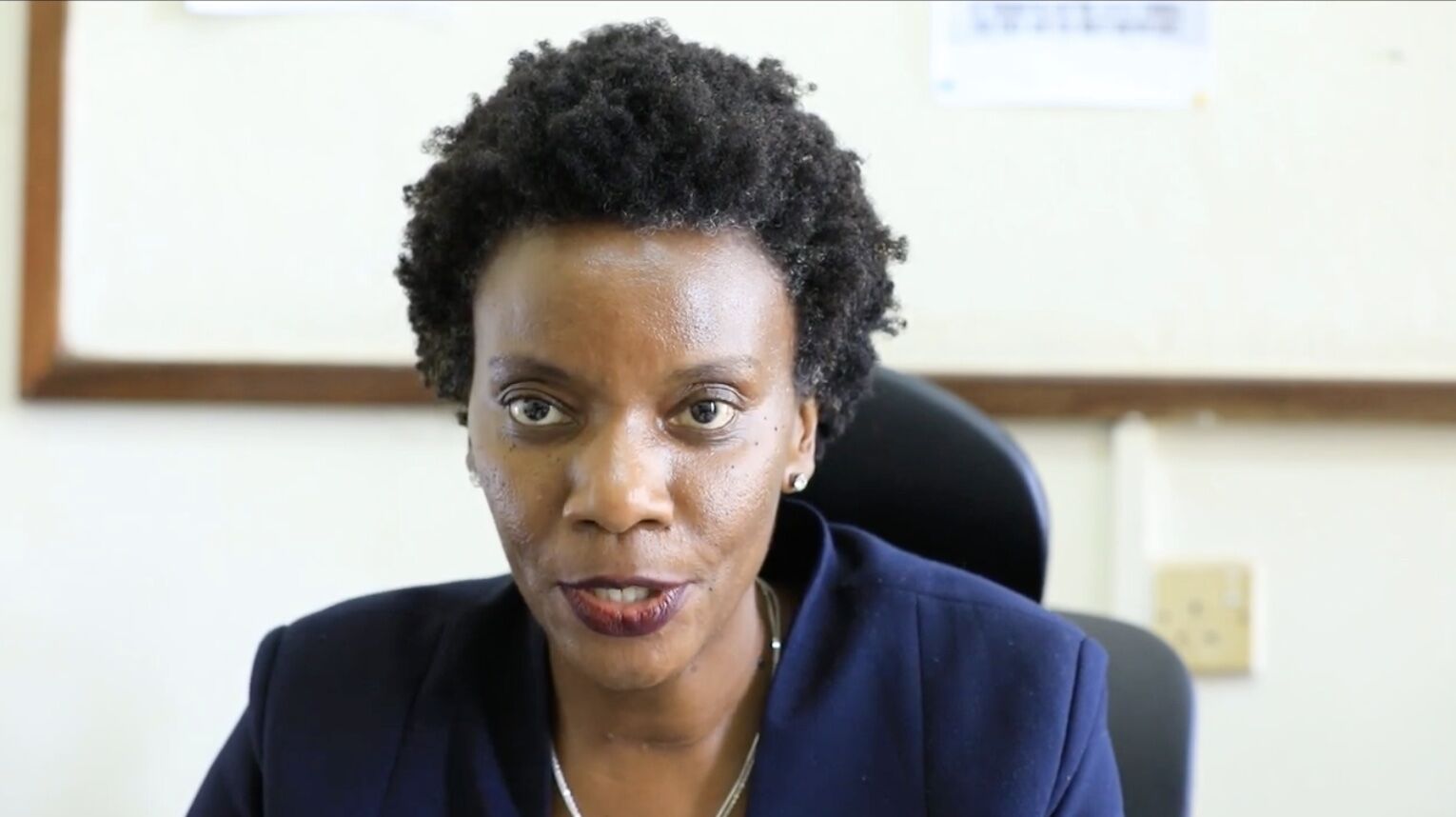
By Mildred Asiimwe / GICJ
The Holocaust, colonialism, the slave trade, the plight of the Palestinian people.
These are the four historical injustices mentioned in the Introduction of the Durban Declaration and Programme of Action. They have one common denominator: racism and intolerant ideologies that led to such humanitarian catastrophes.
Despite the progress achieved towards the eradication of racism from society, we - the global community - are still far from reaching the desired end.
Genocides that are taking place under our watch, wars fought to subdue entire populations to foreign domination, migrants attempting to flee destruction in their home countries only to find themselves enslaved in prison camps, and the hundred thousands Palestinians perishing under the unlawful occupation of their land by Israeli forces, are all stark reminders that hatred, fear of the other, and a disturbing sense of racial superiority still shapes the way states and societies perceive the world.
This is why International Lawyers and Geneva International Centre for Justice stand before you today to offer our solidarity to past and present victims of racism, racial discrimination and xenophobia. We urge states to teach respect, promte anti-racism, promote inclusivity and remove unconscious bias.
Thank you.
Implementation of the Durban Declaration and Programme of Action
General Debate on Item 9: Racism, racial discrimination, xenophobia and related forms of intolerance
27 March
Joint statement by the International Organization for The Elimination of all Forms of Racial Discrimination (EAFORD) and Geneva International Centre for Justice
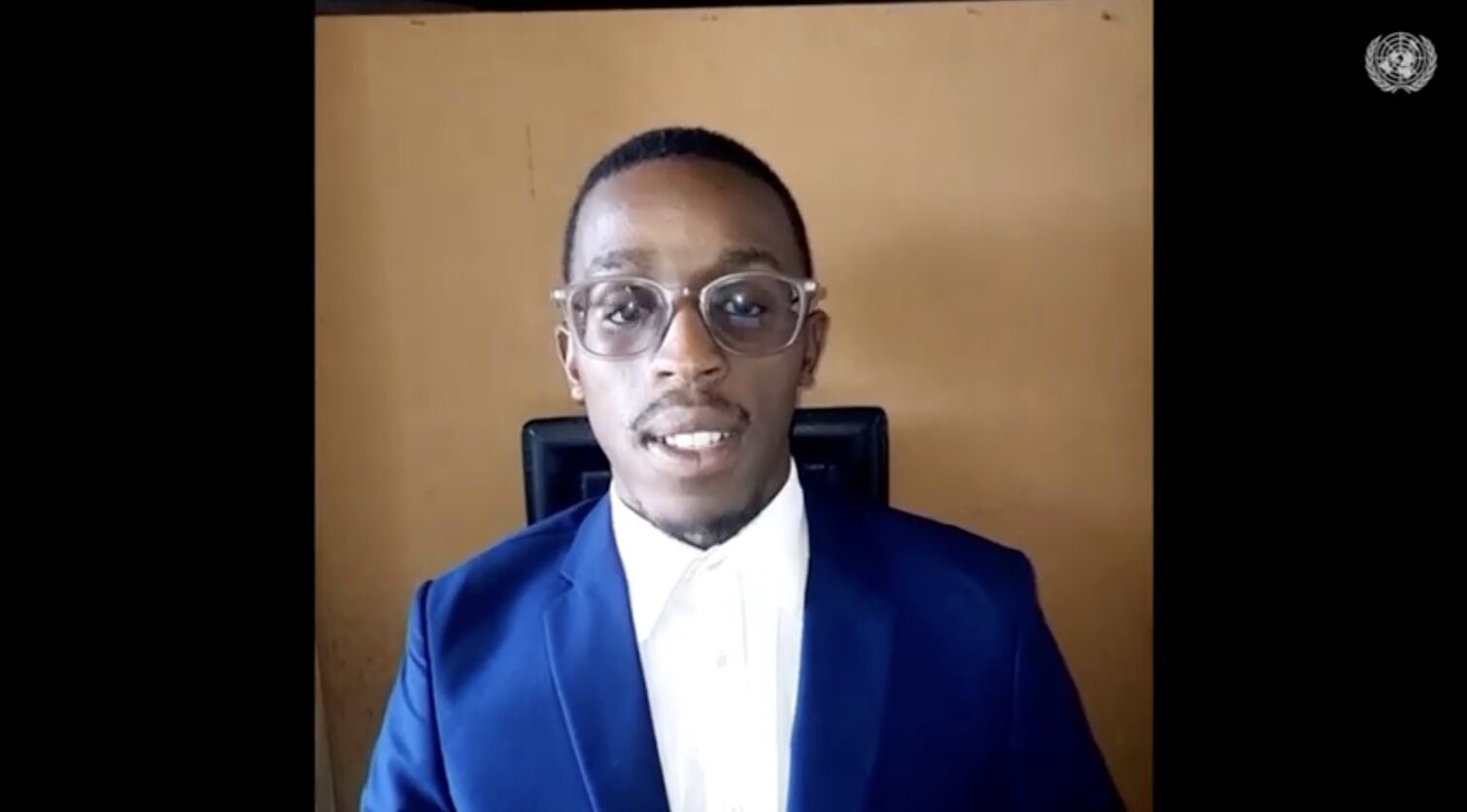
By Teboho Mosebo / GICJ
We appreciate the report on efforts to implement the Durban Declaration and Programme of Action.
However, despite these efforts, racial disparities and xenophobia persist globally, with African Americans 5 times more likely to be imprisoned than whites in the US. Similarly, xenophobia and racism against Indigenous peoples, migrants, and refugees remain concerns in countries like Australia and South Africa. These disparities are often perpetuated by systemic and institutional barriers, highlighting the need for comprehensive reforms.
To address these challenges, effective implementation of the DDPA requires States to strengthen legislation and institutions that promote equality and justice. Enhancing national human rights institutions and fostering international cooperation are crucial. Acknowledging the historical roots of discrimination is also essential, including recognizing the ongoing impacts of discriminatory practices on marginalized communities.
In conclusion, EAFORD and Geneva International Centre for Justice call on States to renew their commitment to the DDPA and address racial discrimination, xenophobia, and intolerance. We stress the need for meaningful participation and consultation with marginalized communities, ensuring their voices are heard and their concerns addressed. Effective implementation of the DDPA is crucial for achieving a world where everyone is treated with dignity and respect. We urge all stakeholders to work together towards this goal.
Thank you.
Commemoration of the International Day for the Elimination of Racial Discrimination
General Debate on Item 9: Racism, racial discrimination, xenophobia and related forms of intolerance
27 March
Joint statement by International Youth and Student Movement for the United Nations (ISMUN) and Geneva International Centre for Justice (GICJ)
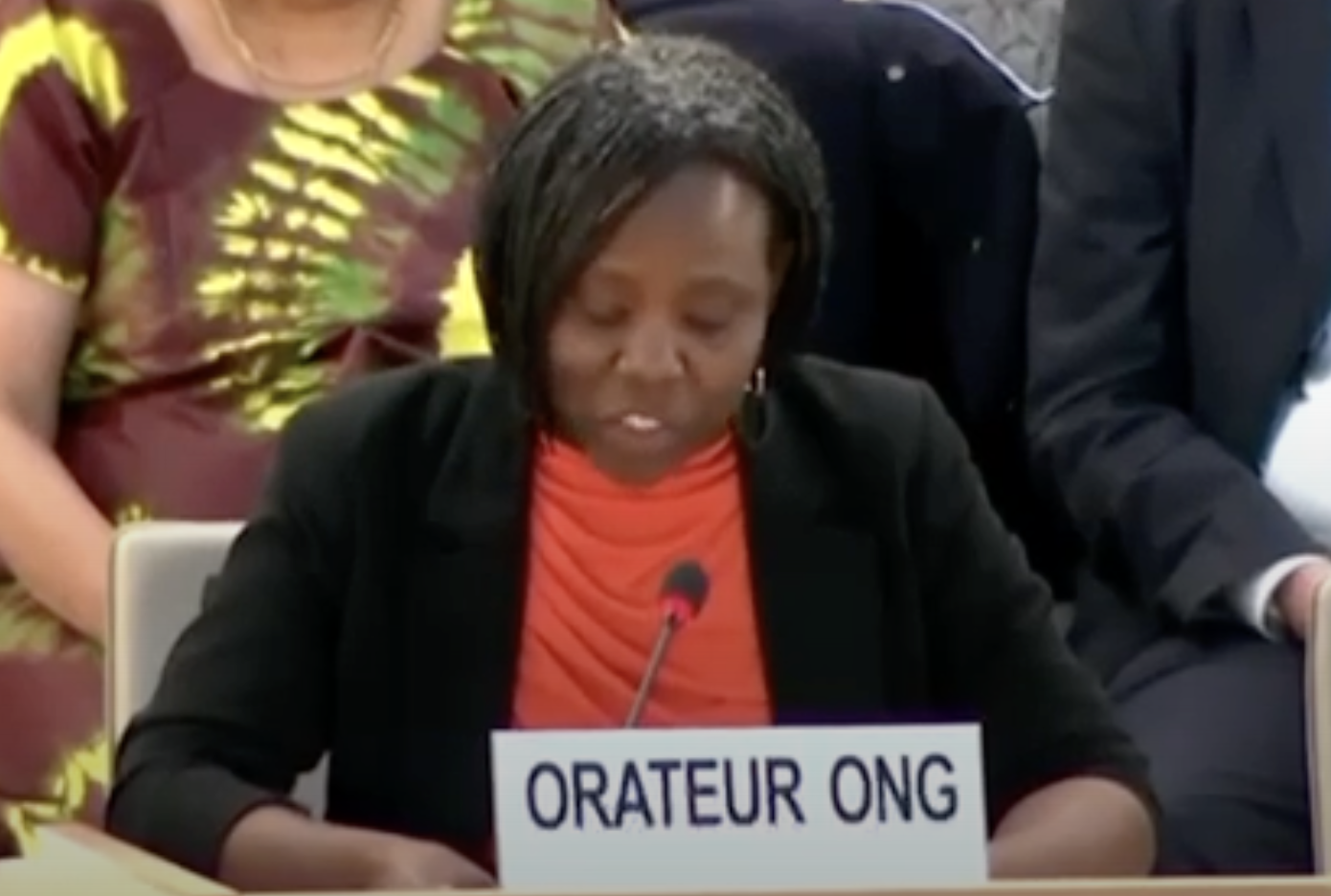
By Patricia Jjuuko / GICJ
Mr President,
We welcome the opportunity to participate in this important panel to observe the sixtieth anniversary of the adoption of the International Convention for the Elimination of Racial Discrimination.
As ICERD was the first international convention to complement the two covenants, its adoption and entry into force demonstrate the centrality of fighting racism for the achievement of all human rights for all.
We want to express our appreciation for the lead role of African and Caribbean states in the initiative to start the negotiations for the convention. Implementation of ICERD can not be seen in isolation from implementing the Durban Declaration and Programme of Action. It should be stressed that CERD has adopted two general recommendations stressing the importance of DDPA implementation and the need for DDPA to be disseminated. In its country concluding observations, CERD regularly requests states to provide specific information on their implementation of DDPA.
In this regard we find the tendency disturbing in some General Assembly resolutions related to the International Decade for People of African Descent to create a contradiction between ICERD and DDPA by reaffirming ICERD and not reaffirming DDPA. Such tendency is in direct contradiction to the good faith implementation of ICERD and CERD positions and militates against the Programme of Activities of the International Decade for People of African Descent.
Undermining the DDPA means undermining ICERD. They firmly belong together in the global combat against racism.
Reports
GICJ participated in several meetings during the Human Rights Council 58. In total GICJ delivered 25 reports, where the meetings were summarised and discussed. By the end of every article GICJ stated its critical positions to each meeting. By clicking in each of the following links you can access the corresponding article.
Voices from the Occupied Palestinian Territory: An Interactive Dialogue on the High Commissioner’s Report (res. 55/28)
26 February
Item 2: Interactive dialogue on the High Commissioner's report on the Occupied Palestinian Territories
By Charlize Chen / GICJ
On 26 February 2025, during the 58th Session of the Human Rights Council, country representatives, human rights organizations, and delegates engaged in an interactive dialogue on the High Commissioner’s report on the Occupied Palestinian Territories. The High Commissioner’s report, submitted under Human Rights Council resolution 55/28, provides an overview of the resolution’s implementation, developments relevant to the human rights situation in the Occupied Palestinian Territories, and the obligation to ensure accountability and justice.
The dialogue underscored the urgency of enforcing human rights in Gaza, even after the ceasefire, highlighting the ongoing genocide of the Palestinian people. Particular attention was given to the testimonies and experiences of those affected, especially women and children. The violence—unnecessary and disproportionate—has displaced tens of thousands, many of whom are in urgent need of humanitarian assistance.
Additionally, concerns persist regarding the Israeli justice system’s capacity and willingness to ensure accountability, uphold international standards of impartiality and independence, and take responsibility for continued human rights violations against the Palestinian people. Participants also reaffirmed the importance of a two-state solution, envisioning Israel and Palestine coexisting peacefully after the ceasefire, with East Jerusalem as the capital of Palestine.
Geneva International Centre for Justice (GICJ) supports the High Commissioner’s report and urges all parties to comply fully with international humanitarian law. GICJ also calls for the removal of all barriers to aid, an increase in humanitarian assistance, and an end to the blockade. GICJ reminds the international community that it must make every effort to secure a just peace in the Middle East, protect women and children, end the occupation, and safeguard the rights of the Palestinian people. Furthermore, GICJ emphasizes the crucial need for accountability and justice for violations committed.
EID on the Situation of Human Rights in Eritrea
27 February
Item 2: Enhanced Interactive Dialogue on the Situation of Human Rights in Eritrea
By Jamel Nampijja / GICJ
Several panelists participated in the Enhanced Interactive Dialogue on the human rights situation in Eritrea, which took place at the 8th Meeting of the 58th Session of the Human Rights Council on 27th February 2025. Among them were the Special Rapporteur on Human Rights in Eritrea, an Eritrean representative, and the Assistant Secretary-General for Human Rights.
The Special Rapporteur and Assistant Secretary-General for Human Rights also stressed the need for Eritrea to address impunity and implement necessary reforms while encouraging further cooperation with UN bodies.
The representative of Eritrea Mr Habtom Zerai, strongly rejected the politicised mandate and called for its termination, emphasising the country's progress in education, healthcare, and sovereignty in handling internal affairs. He argued that external interference undermines Eritrea's efforts and sovereignty, inviting constructive cooperation instead of condemnation.
During the interactive dialogue, several representatives expressed deep concern about the ongoing human rights violations in Eritrea. They echoed the Special Rapporteur's concerns regarding the systematic repression of fundamental freedoms, such as freedom of expression, association, and assembly. The Eritrean government's continued use of indefinite national service, arbitrary detentions, and religious persecution were also focal points in their statements.
Representatives called for greater accountability from the Eritrean government, urging it to take concrete steps to address human rights abuses and engage meaningfully with international human rights mechanisms. Many stressed the importance of ending the practice of indefinite conscription and providing justice to those detained without trial.
On the other hand, some representatives defended the government's actions, arguing that the situation was being misrepresented. They emphasised the positive strides Eritrea has made in areas like healthcare, education, and gender equality. The representatives expressed support for Eritrea's sovereignty and argued that the ongoing sanctions and external pressures compounded the country's challenges. They critiqued the Human Rights Council's focus on Eritrea as biased and politically motivated, asserting that it overlooked Eritrea's progress and the country's history of resilience in the face of adversity.
The international community was urged to hold Eritrea accountable for its obligations under international human rights law and to press the Eritrean government to implement key reforms, including the cessation of indefinite military service, improved judicial transparency, and full cooperation with international human rights mechanisms. The UN remains committed to assisting Eritrea in addressing these challenges and fostering meaningful reforms.
Geneva International Centre for Justice (GICJ) is concerned that the Eritrean government continues to perpetrate widespread and systematic violations against its people with the utmost impunity. Arbitrary detentions, enforced disappearances, and torture are prevalent. Authorities relentlessly suppress fundamental freedoms, including freedom of expression, association, and religious belief.
GICJ calls on the government of Eritrea to immediately and unconditionally release all political prisoners, journalists, prisoners of conscience, and individuals detained for their faith.
Enhanced ID on report of the High Commissioner on the Sudan with the assistance of the Designated Expert (S-36/1)
27 February
Item 2: Annual report of the United Nations High Commissioner for Human Rights and reports of the Office of the High Commissioner and the Secretary-General
By Lorenzo Bersellini / GICJ
On 27 February 2025, the Human Rights Council convened to discuss the High Commissioner’s report on the Situation of Human Rights in Sudan (A/HRC/58/29). The report, submitted pursuant to Human Rights Council resolution S-36/1, continues to highlight the multiple violations committed by the Sudanese Armed Forces (SAF) and the Rapid Support Forces (RSF) in the period between 16 December 2023 and 15 November 2024, including sexual and gender-based violence, arbitrary detentions, and artillery shelling in densely populated areas.
During the dialogue, the High Commissioner for Human Rights, the African Union Special Envoy for the prevention of the Crime of Genocide and other Mass Atrocities in Africa, members of civil society and many states called for the warring parties to lay down their weapons, to find a lasting political solution to the conflict in Sudan, and ensure justice for the victims of grave violations. Multiple delegates also insisted on the importance of respecting Sudan’s sovereignty and territorial integrity and of fostering a comprehensive dialogue – including the country’s civil society, neighboring states, and regional organisations supported by the UN - to solve the crisis.
Geneva International Centre for Justice (GICJ) strongly condemns the unlawful conduct of war by the belligerent parties in Sudan, which has resulted in widespread human rights and humanitarian violations and abuses. In particular, GICJ denounces the sexual and gender-based use of violence as a systematic method of warfare, disproportionately affecting women, children, and aid workers. Furthermore, the increase of ethnically motivated attacks is particularly alarming and needs to be stopped. GICJ stands with all the innocent victims of one of the worst humanitarian catastrophes in the world and urges all parties involved to stop fighting and ensure accountability for perpetrators of crimes.
Escalating Human Rights Crisis in Afghanistan, Warns Special Rapporteur
28 February
Item 3: Interactive Dialogue on the Report of the Special Rapporteur on Afghanistan
By Hiya Sharma / GICJ
The 58th Session of the UN Human Rights Council held an interactive dialogue to examine the Special Rapporteur’s latest report on the human rights situation in Afghanistan. Special Rapporteur Richard Bennett reported an alarming deterioration of human rights under Taliban rule, characterised by systematic gender-based oppression, persecution of minorities, and a dire humanitarian crisis. He warned that the Taliban’s institutionalised oppression of women and girls may amount to gender apartheid – a crime against humanity and detailed how draconian Taliban policies have devastated Afghan society. Delegations from numerous countries overwhelmingly condemned the Taliban’s abuses, with many calling for urgent accountability measures and insisting that no international recognition or normalisation of the Taliban should occur until there are concrete improvements in human rights.
Geneva International Centre for Justice (GICJ) endorses these concerns and urges robust international action: the Taliban must be held accountable for their atrocities, Afghanistan’s civilians must receive increased humanitarian support, and the rights and dignity of Afghan women, girls, and minorities must be at the forefront of the global response.
The Interactive Dialogue on the Special Rapporteur of torture and other cruel, inhuman or degrading treatment or punishment
4 March
Item 3: Promotion and protection of all human rights, civil, political, economic, social and cultural rights, including the right to development
By Shrimeti Jungo / GICJ
During the 58th Session of the Human Rights Council, on 4 March 2025, delegates, representatives of countries and non-governmental organisations participated in an interactive dialogue about the report presented by Ms Alice Jill Edwards, the Special Rapporteur on torture and other cruel, inhuman or degrading treatment or punishment. This year marks the 40th anniversary of the creation of this mandate;however, despite some progress, the eradication of torture remains far.
The Special Rapporteur introduced the report to the Council, focusing particularly on hostage-taking, and its role in the context of torture. It was reiterated that hostage-taking “almost always involves torture”, highlighting the importance of incorporating hostage-taking to the discourse. In this regard, there was no contemplation, as practically all representatives welcomed the report and agreed that hostage-taking and arbitrary detention are serious violations of human rights and international humanitarian law (IHL). However, the only source of dissent was expressed by some States who underpinned the torture faced by Palestinians who are arbitrarily detained. These States disagreed with the report and challenged its lack of holistic and balanced approach when addressing the event of 7 Oct 2023. A similar occurrence happened with regards to Ukraine and Russia.
In essence, throughout the dialogue, representatives upheld the need for prevention and elimination of all torture, including the hostage-takings and those in detention centres.
Geneva International Centre for Justice (GICJ) strongly condemns torture and all other degrading mistreatments, committed by State and non-State actors, including hostage-taking. We stress the importance of strengthening a non-discrimantory international and national legal system that ends all torture and guaranteeing adequate judicial review for those unfairly and ill treated detainees. GICJ supports the notion that all hostages, whomever they are, must be released unconditionally and immediately. Finally, GICJ underpins the demand that all perpetrators of torture and those who facilitate hostage-takings must be held liable.
Dialogue on Transitional Justice
5 March
Item 3: Enhanced Interactive Dialogue on OHCHR Report on Transitional Justice
By En Xi Tan and Jui Dharwadkar / GICJ
On 5 March 2025, country representatives, human rights organizations, and delegates engaged in an Enhanced Interactive Dialogue on the report prepared by the High Commissioner titled “Human Rights and Transitional Justice”. The report, submitted pursuant to Human Rights Council resolution 51/23, identifies examples of effective practices and lessons related to transitional justice processes, in the context of sustaining peace and sustainable development, particularly with regard to Sustainable Development Goal 16. It focuses on victim-centric, gender inclusive and innovative approaches to contribute to a tangible and transformative impact on vulnerable communities.
In the context of countries which have witnessed grave human right violations, the dialogue highlighted principles of accountability and region-specific mechanisms as the pillars of sustainable development and peace. The discussion recognized practical challenges to the realization of transitional justice and reinforced its institutionalization through victim participation, reparation and non-repetition. The contributions of grass-root organizations, specifically by the youth and women, were underscored in overcoming these threats.
Geneva International Centre of Justice (GICJ) supports the High Commissioner’s report and calls on States and civil society organizations to reinforce urgency of taking action. Transitional justice is instrumental in bringing sustainable development and long-lasting peace in challenging contexts. GICJ strongly urges State institutions to comply with the recommendations suggested by the High Commissioner’s Report and highlight the need for the integration of youth in aiding the process.
Location Linked Risks for Human Rights Defenders in Rural Areas
5 and 6 March
Item 3: Interactive Dialogue with the Special Rapporteur on Human Rights Defenders
By Muriel Imhof / GICJ
On 5 March 2025, during the 58th Session of the Human Rights Council, Special Rapporteur Mary Lawlor presented her Report on the situation of human rights defenders, which was followed by an Interactive Dialogue with Member States and NGOs on 5 and 6 March 2025.
The report underscored that human rights defenders in isolated, remote, or rural contexts are often confronted with heightened risks due to their geographic isolation, including limited access to support networks, increased vulnerability to state and non-state reprisals, and difficulties in raising international awareness about their work.
Geneva International Centre for Justice (GICJ) fully supports the Special Rapporteur's report, particularly its focus on establishing effective protection mechanisms and enhancing digital security resources. GICJ calls on States to take proactive steps to protect human rights defenders, especially those in isolated, remote, or rural areas, and to create policies that address the unique needs of marginalized groups. Additionally, GICJ urges businesses to assume responsibility and highlights the crucial role of civil society organizations in safeguarding and supporting human rights defenders in rural areas.
Preventing Genocide – Understanding Root Causes and Identifying Early Warning Signs
5 March
Panel on Early Warning and Genocide Prevention
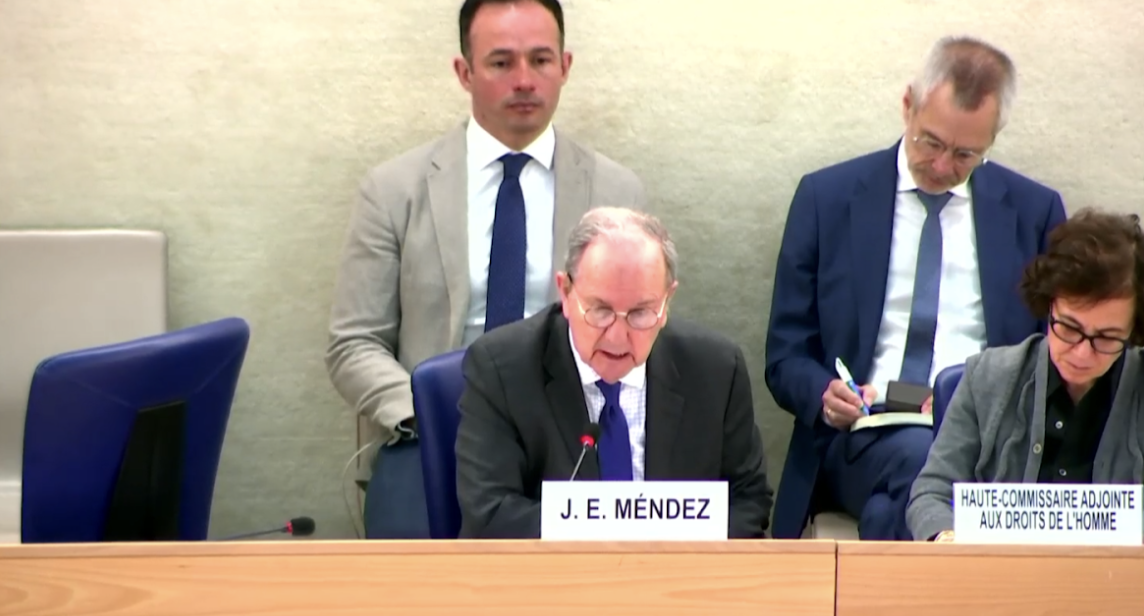
By Muriel Imhof / GICJ
On 5 March 2025, during the 58th Session of the Human Rights Council, expert panelists, country representatives, human rights organisations, and delegates engaged in a discussion on early warning and genocide prevention. The resolution on the Prevention of genocide, submitted under Human Rights Council resolution A/HRC/RES/55/13 adopted on 3 April 2024, reiterated the responsibility of each individual State to protect its population from genocide, which entails the prevention of such a crime, including incitement to it, through appropriate and necessary means. The resolution explains that the identification of the root causes, as well as early warning signs, can assist in the prevention of genocide.
The panel underscored the collective responsibility to prevent mass atrocity and the need to strengthen the regional organisation, for example better access to the information flow, inclusion of civil society organisations in the decision-making process. The panel highlighted that the major block in preventing genocide is the lack of political will. They echoed the resolution in stating that violations of human rights and international humanitarian law can lead to genocide and pointed out that waiting until all elements of the definition of genocide are in place, the genocide has happened and cannot be prevented anymore. The panelists cautioned that selective application of international law erodes the credibility of the multilateral system and dilutes the protection regimes.
Geneva International Centre for Justice (GICJ) supports the call to address risk factors before they escalate into more serious concerns, particularly the emphasis on the national risks assessments and the coordination with civil society in addressing identified risks. GICJ calls on States to address online hate speech by creating and enforcing domestic policies and regulations. GICJ also encourages that national legislations criminalise genocide and that States take on the ultimate responsibility for preventing genocide.
Securing Homes, Upholding Dignity
7 March
Item 3: Interactive Dialogue with the Special Rapporteur on Adequate Housing
By Charlize Chen / GICJ
In the interactive dialogue with Mr. Balakrishnan Rajagopal, the Special Rapporteur on adequate housing, delegates spoke on the importance of housing as a component of the right to an adequate standard of living. The Special Rapporteur first elaborated on the challenges faced by migrants crossing international borders, including refugees and asylum-seekers, in exercising their right to adequate housing. He also discussed how migrants in transit often endured extremely precarious living conditions, such as residing in informal camps, makeshift settlements, abandoned buildings, train stations, and other public spaces. They continue to be victims of discriminatory anti-migrant policies, racism, and xenophobia that push them farther to the margins of society.
In response to the Special Rapporteur’s concerns, country representatives, speakers, and NGOs called for recommendations to improve access to adequate housing for all migrants and for a global political response. These speakers conceded that it is refugees, asylum-seekers, and other migrants who are among the groups most likely to suffer violations of the right to adequate housing, far from being those who contribute to creating housing crises. Based on the commentary of representatives, the Special Rapporteur responded to the dialogue and reiterated the call for adequate housing without discrimination for all migrants, regardless of documentation.
Geneva International Centre for Justice (GICJ) supports the Special Rapporteur’s report on adequate housing and the collaboration of the international community on a multilateral strategy to address migration, including the development of shelter and housing policies, programs, and implementation frameworks to aid migrants at risk of marginalisation. GICJ also endorses the adoption of national housing strategies that are inclusive of the needs of all migrants. Additionally, GICJ encourages public and private actors to treat migrants with understanding, demonstrating a strong commitment to grant them a place of residence without discrimination or judgment.
Strengthening Human Rights Safeguards in Counter-Terrorism Efforts
11 March
Item 3: Interactive Dialogue with Special Rapporteur on the Promotion of Human Rights and Fundamental Freedoms while Countering Terrorism
By Matilde Gamba / GICJ
On 11 March 2025, during the 25th Meeting of the 58th Session of the Human Rights Council, country representatives and delegates convened to discuss the report of the Special Rapporteur Ben Saul on the Promotion and Protection of Human Rights and Fundamental Freedoms while Countering Terrorism (A/HRC/58/47). The Special Rapporteur’s report underscored the growing importance of regional organisations in upholding human rights while countering terrorism. Mr. Saul highlighted that while regional organisations play a key role in fostering international security, their actions must align with international human rights obligations to ensure that counter-terrorism measures protect human rights and fundamental freedoms rather than suppress them.
The Special Rapporteur’s report highlighted the challenges posed by regional counter-terrorism policies and identified three key areas for improvement. First, Mr. Saul called for greater engagement with civil society organisations (CSOs) to enhance transparency, legitimacy, and public confidence in counter-terrorism measures. Second, the Special Rapporteur highlighted the risks associated with the misuse of counter-terrorism sanctions against political opponents, activists, and journalists, calling for stricter due process safeguards and independent review mechanisms. Lastly, the report underscored the importance of aligning regional military cooperation with International Humanitarian and Human Rights Law, ensuring accountability for violations.
The Special Rapporteur urged regional organisations to redefine their definitions of terrorism to prevent abuse and ensure that legal cooperation and intelligence-sharing align with human rights standards. Moreover, Mr. Paul recommended that participants account for human rights and gender considerations in counter-terrorism policies and improve accountability mechanisms, particularly concerning victim support. The interactive dialogue underscored the urgency of adopting a balanced approach that safeguards human rights and fundamental freedoms while effectively neutralising terrorism. Multiple delegates echoed the Special Rapporteur’s call for stronger human rights safeguards in counter-terrorism policies, emphasising accountability and transparency. Conversely, other delegations defended their national or regional strategies, arguing that security measures must precede certain rights considerations when combating terrorist threats. Participants raised concerns about the potential misuse of CSO engagement for ulterior motives, while others stressed the need to address terrorism’s root causes, such as poverty and governance failures.
Geneva International Centre for Justice (GICJ) strongly supports the Special Rapporteur’s call for greater accountability in counter-terrorism measures to protect fundamental rights and freedoms. GICJ urges regional organisations to prevent human rights violations under the guise of security, ensure meaningful civil society participation, and implement independent oversight of military operations to address the root causes of terrorism. GICJ firmly condemns all acts of terrorism as unjustifiable and calls for legal safeguards against politically motivated sanctions and stronger protection for individuals facing repression. Without embedding human rights protections in counter-terrorism efforts, sustainable security and justice cannot be achieved.
Interactive Dialogue on Food as a Fundamental Human Right and Transforming Food Systems to Serve the People
11 March 2025
Item 3: Interactive Dialogue with Special Rapporteur Food
By Dilinna Nwabueze / GICJ
“How can countries use the right to food to transform their national food system?” asked Mr. Michael Fakhri, Special Rapporteur on the right to food, during the 24th Meeting of the 58th Session of the Human Rights Council on 11 March 2025. The solution is to have food systems designed to serve the people because the right to food is a human right. He warned small countries, island countries, and developing countries to change their food systems now to minimize the risk of hunger, famine, and starvation.
According to Mr. Fakhri, most food systems do not serve the people but instead produce violence, violate human rights, and serve the interests of corporations, financiers, and the wealthy. Countries should not have to decide between servicing their debt or feeding their people. Human rights need to play an essential role in transforming global food systems, not corporations and international financial institutions. There must also be accountability from powerful countries that directly or indirectly support starvation as a weapon of war. Such weaponry can be seen in Palestine and Sudan.
During the Interactive Dialogue, many delegates spoke of a dire need to address food security and nutrition. There were many calls for the end of starvation as a weapon of war, international cooperation for the transformation of global food systems, and the establishment of the right to food as a fundamental human right. The Special Rapporteur called for governments to optimize current spending by reducing high borrowing costs to transform their existing food systems. He also proposed a clear methodology on how to assess current spending on food and how to transform existing budgets into serving the needs of the people’s right to food.
Geneva International Centre for Justice (GICJ) supports transforming global food systems to reduce and prevent hunger, famine, and starvation. The right to food is a human right. It should not be used as a weapon, and it should not serve the interests of corporations and the wealthy. GICJ joins the call to direct funding toward strengthening national food systems and programs. Food systems must be more socially equitable, sustainable, and climate-friendly.
Dialogue on the Human Rights Violations against Children, Especially in Organised Trafficking Networks
12 March
Item 3: Interactive Dialogue with Special Representative of the Secretary General on Violence Against Children
By Prishika Adhira Bhoyroo and Shyla Gheek / GICj
On 12 March 2025, the Human Rights Council convened to discuss the Special Representative of the Secretary-General’s (SRSG) report on violence against children, which underscored the alarming rise in child trafficking, exploitation, and abuse worldwide. The report highlighted that children now account for 38% of trafficking victims, with an increase in cases involving girls. It further outlined the growing role of technology and organised crime networks in facilitating these crimes, while legal responses remain insufficient.
During the dialogue, the SRSG called for urgent investments to end impunity, strengthen child protection systems, and address the economic and social costs of violence. Delegates and civil society organisations emphasised the need for stronger international cooperation to address root causes of vulnerability, such as conflict, forced displacement, and economic disparity. Several states, including the European Union, Germany, and Peru, reiterated support for age and gender responsive policies. Others, such as Brazil and Saudi Arabia, detailed national strategies and legal frameworks to combat trafficking.
Geneva International Centre for Justice (GICJ) welcomes the widespread engagement and reaffirmed the commitment to achieving the 2030 SDGs. We emphasise the need for peer learning, technological safeguards, and strengthened accountability mechanisms. GICJ calls for more robust international efforts, including stricter business regulations to prevent exploitation in supply chains and to incorporate ethical participation of children in policy discussions.
A Call to Protect the Rights of Children in Armed Conflict
12-13 March 2025
Item 3: ID with SRSG on children and armed conflict
By Samantha Rodríguez Santillán / GICJ
On 12 and 13 March 2025, at its 27th to 29th meetings of the 58th regular session, the Human Rights Council held the interactive dialogue on children and armed conflict with the Special Representative of the Secretary-General, Ms. Virginia Gamba, as part of her annual thematic work on this matter (A/HRC/58/18).
The report, covering the period from December 2023 to December 2024, summarises the efforts of the Special Representative of the Secretary-General for Children and Armed Conflict (SRSG). It reviews actions taken to address serious violations against children, advocacy efforts, collaboration with international and regional partners, and findings from field visits. It also outlines ongoing challenges, progress achieved, and suggestions to improve child protection in conflict settings.
During the interactive dialogue, delegates have expressed their concern for the increase in children casualties in war and violations of their most fundamental rights. Calls were made in support of the international commitment to protect children from such atrocities, as embodied by the SRSG mandate. Nevertheless, the delegate of the State of Palestine criticised the report for not putting sufficient emphasis on the plight of Palestinian children.
Geneva International Centre for Justice (GICJ) expresses a deep alarm and moral outrage at the scale of grave violations occurring with impunity, with particular focus in Palestine, Syria or Yemen. Despite the overwhelming and well-documented nature of these atrocities, we are concerned that the current UN reports fail to appropriately recall the ongoing crimes against humanity against children. We called on the international community to strengthen and fund national child protection systems, including psychosocial support, education, and reintegration programs for children affected by armed conflict.
ID with SR on the sale, sexual exploitation and sexual abuse of children
13-14 March 2025
Item 3: SR on the sale, sexual exploitation and sexual abuse of children
By Samantha Rodríguez Santillán / GICJ
On 13-14 March 2025, at its 29th and 30th meeting of the 58th regular session, the Human Rights Council held the interactive dialogue on the sale, sexual exploitation and sexual abuse of children with the Special Rapporteur, Ms. Mama Fatima Singhateh.
The presented report (A/HRC/58/52)[1] outlines the activities of the Special Rapporteur and the activities undertaken since the last report. The study focuses on the sexual abuse of children within peacekeeping and humanitarian settings. The report identifies gaps in current efforts to address child sexual abuse and offers recommendations, emphasising the need to adopt a child-rights approach and tackle impunity for those responsible for these crimes.
During the interactive dialogue, states supported the SR in condemning every form of sexual violence affecting children. They condemned abuses and violations perpetrated by blue-helmets, who abuse their status as guarantor of peace to exploit vulnerable children. Delegates thus called for better accountability and for measures to safeguard victims on the ground.
Geneva International Centre for Justice (GICJ) is deeply concerned about the serious violations committed by UN peacekeepers, including acts of terror and abuse against children. These actions, which contravene international law, not only cause irreparable harm to victims but also undermine the credibility and mission of the United Nations and all peace-seeking nations. GICJ therefore urges the establishment of an independent international mechanism to ensure accountability, end impunity, and prevent further harm to children in peacekeeping and humanitarian contexts.
The ocean's degradation is affecting the enjoyment of human rights
14 March
30th Meeting: Interactive Dialogue with the Special Rapporteur on the human right to a clean, healthy, and sustainable environment.
By Teboho Mosebo/ GICJ
During the 30th Meeting of the Human Rights Council's 58th Session, held on 14 March 2025, country representatives, human rights organisations, and delegates gathered for an interactive dialogue on the Special Rapporteur’s report (A/HRC/58/59), Astrid Puentes Riano, on the human right to clean, healthy and sustainable development.
The dialogue put special emphasis on the ocean and human rights. The Special Rapporteur presented her report highlighting the devastating impact of human activities on the ocean and its resources. The report emphasised the need for a human rights-based approach to ocean governance, recognising the rights of Indigenous Peoples, small-scale fishers, and marginalised communities. It also stressed the importance of addressing the root causes of ocean degradation, including pollution, overfishing, and climate change.
Additionally, Ms. Riàno touched on the report (A/HRC/58/59/Add.1) of the former mandate-holder, David R. Boyd, which underscored the country's visit to Maldives from 16 to 25 April 2024. Maldives is one of a handful of atoll nations facing an existential threat from rising sea levels. The visit aimed to identify good practices and investigate the environmental challenges the country faces, the climate crisis. Finally, participants expressed grave concern over the alarming decline in ocean health. They reiterated their strong commitment to promoting global partnerships and policies that protect and preserve the ocean.
Geneva International Centre for Justice (GICJ) stresses the need for urgent action to protect the ocean and its resources. We call on States and businesses to recognise and respect human rights in all ocean-related activities and to take concrete steps to address the environmental and human rights impacts of their actions.
Interactive Dialogue with the Commission of Inquiry on the Syrian Arab Republic
18 March
Item 4: Interactive Dialogue with the Independent International Commission of Inquiry on the Syrian Arab Republic
By Hiya Sharma / GICJ
During the 58th Session of the Human Rights Council, the Interactive Dialogue with the Independent International Commission of Inquiry (COI) on the Syrian Arab Republic marked a historic turning point. For the first time, the COI was granted access to Syria following the December 2024 removal of the Assad government. Mr. Paulo Sérgio Pinheiro, Chair of the Commission, presented an overview of extensive human rights violations committed over the last 14 years. These included arbitrary detention, torture, extrajudicial killings, and the systemic destruction of civilian infrastructure. He highlighted the COI’s recent visits to former detention centres and mass grave sites, reiterating findings that these crimes may amount to crimes against humanity. The Commission's latest report, "Pillage and Plunder," was also presented, detailing the widespread appropriation and destruction of property belonging to refugees and internally displaced persons. Despite the political transition, Mr. Pinheiro warned of the dangers of revenge attacks, displacement, and renewed violence.
Geneva Centre for International Justice (GICJ) supports the Commission's call for a comprehensive transitional justice process rooted in truth, accountability, and reparations. GICJ calls on the international community to prioritise justice mechanisms, the protection of those who are displaced, and the monitoring of the human rights situation in Syria.
Joint ID with the Special Rapporteur on the Islamic Republic of Iran and Independent International Fact-Finding Mission on the Islamic Republic of Iran
18 March
Item 4: Human Rights Situations that require the attention of the Council
By Lorenzo Bersellini / GICJ
On 18 March 2025, the Human Rights Council convened during its 58th session to hold a joint interactive dialogue on the situation of human rights in Iran. One of the main themes that has been discussed was the increase in the use of the death penalty by Iranian authorities, which reached a new height last year. Moreover, reports of gender and sexual-based violence, including killings, arbitrary detention, and discrimination affecting women and girls as well as members of religious minorities were all brought forward by Ms. Mai Sato, the current Special Rapporteur (SR), and by Ms. Sara Hossain, Ms. Shaheen Sardar Ali, and Ms. Viviana Krsticevic, members of the Independent International Fact-Finding Mission (IFFM) in Iran.
Ms. Sato presented her first report (A/HRC/58/62) since assuming the mandate in 2024, whereas the IFFM exposed the findings of their latest report (A/HRC/58/63) focusing on the human rights violations and crimes against humanity committed by the State in response to the widespread protests headed by the “Women, Life, Freedom” movement in Iran since 2022. Both the SR and the IFFM denounced the increased recurrence of the death penalty. More than 900 executions in 2024 alone have been registered, making Iran the highest per capita user of the death penalty. Of all these cases, only 10% were officially communicated by state channels, showing the lack of transparency signaled by the SR as a critical issue. The death penalty has been used as a way to silence dissent, including for children, and punish non-lethal crimes, including drug dealing.
The UN Human Rights Mechanisms also shed light on the systematic legal, economic, and political discrimination suffered by women and girls, as well as members of minority groups.. The unequal recognition of these categories of people in front of the law exposes them to further vulnerability. During the debate, the Council was divided between delegates that applauded the SR and IFFM for their findings - calling on the Council to renew their mandate and to further investigate the human rights violations given the widespread report and alarming trends witnessed in the country - and those delegates that, instead, echoed Iran in denouncing the perceived politicization and instrumentalization of the Council by western states seeking to overthrow the current government.
Geneva International Centre for Justice (GICJ) welcomes the SR and IFFM for their reports that will serve as the basis for future accountability for the egregious crimes perpetrated by state authorities in Iran. GICJ is appalled by the widespread use of the death penalty, particularly when it comes to children. Furthermore, GICJ urges the government of Iran to grant full rights and protection to all its citizens, including women and girls and members of religious or ethnic minorities, unequivocally siding with the victims of the regime's violations.
Accountability for Crimes Against Humanity in Ukraine
19 March
Item 4: Interactive Dialogue with Commission of Inquiry on Ukraine
By Matilde Gamba / GICJ
On 19 March 2025, during the 36th Meeting of the 58th Session of the Human Rights Council, country delegates convened to discuss the findings of the Independent International Commission of Inquiry (COI) on Ukraine (A/HRC/58/67). Mr. Erik Møse, the COI’s Chair, together with Mr. Pablo de Greiff and Ms. Vrinda Grover, two human rights experts and members of the COI, presented their latest report. The latter provided a detailed overview and description of the grave violations of International Human Rights Law (IHRL) and International Humanitarian Law (IHL) in the context of the Russian Federation’s ongoing war of aggression against Ukraine.
As the war enters its fourth year, as of 24 February 2024, over 12,654 civilians have been killed and over 29,392 injured, according to the Office of the High Commissioner for Human Rights (OHCHR). The war has also caused large-scale destruction of homes and critical public infrastructure.
The COI’s report presented substantial evidence of crimes against humanity committed by the Russian armed forces and the Federal Security Service of the Russian Federation (FSB) as part of a coordinated, widespread, and systematic state policy against Ukrainian civilians and prisoners of war (POWs). Mr. Erik Møse further highlighted the failure of the Russian Federation to inform the families of the whereabouts of those they were detaining. Despite 31 formal requests from the Commission, Russian authorities have refused to cooperate or provide responses about missing individuals. The COI’s report also documented the use of torture, sexual violence, and gender-based violence by the Russian forces during detention as crimes against humanity.
The interactive dialogue underscored the urgency of judicial and non-judicial accountability measures to address the systematic violations and human rights abuses committed during the war. Multiple country delegates expressed grave concern over the COI’s findings and reiterated their support for renewing the Commission’s mandate. Conversely, Russia was absent from the HRC session and refused to cooperate with the COI’s independent and impartial activities. Belarus and the Democratic People’s Republic of Korea (DPRK) criticised the Commission’s inquiry as politically biased.
Geneva International Centre for Justice (GICJ) firmly supports and welcomes the COI’s report and urges the international community to provide necessary resources to facilitate the Commission’s independent and impartial investigations. GICJ strongly condemns the grave human rights violations and crimes against humanity committed by Russian authorities against Ukrainian civilians and calls for immediate and effective international action to end the cycle of impunity. The victims of these heinous crimes deserve justice and the global community must ensure that accountability remains a top priority.
ID with Special Rapporteur on the situation of human rights in Myanmar
19 and 20 March
Item 4: Human rights situations that require the Council’s attention
By Shyla Gheek / GICJ
On 19 and 20 March, the Human Rights Council assembled to discuss the Special Rapporteur’s report on the situation of human rights in Myanmar, four years after the military coup. which underscored the two major challenges of violence and oppression faced in the state. The Special Rapporteur on the situation of human rights in Myanmar, Mr. Thomas H. Andrews, presented a stark and urgent appeal to Member States, warning of an escalating humanitarian and human rights catastrophe. Highlighting the importance and effectiveness of international support and the dire threat of destabilization without it.
During the dialogue, numerous States, including Australia, Japan, and Bangladesh, echoed concerns over the humanitarian emergency, attacks on minority groups such as the Rohingya, and barriers faced by persons with disabilities. Several delegations welcomed sanctions and due diligence efforts already taken to limit the junta’s access to weapons and finances, while others, such as Turkey and Indonesia, called for stronger international coordination and increased humanitarian support. Civil society organisations urged an immediate reversal of aid cuts and emphasised the need for justice, accountability, and the protection of human rights defenders.
Geneva International Centre for Justice welcomes the wide engagement and supports the Special Rapporteur’s call to action. We stress the urgent need to block the junta’s access to resources, reaffirm commitments to international humanitarian aid, and ensure justice mechanisms are supported. GICJ urges the Council to take meaningful steps to uphold human dignity and protect the people of Myanmar in this time of grave need.
Human Rights Concerns that Require the Council’s Attention
20 March
Item 4: General Debate on Item 4
By Dilinna Nwabueze / GICJ
During the General Debate on Item 4, many delegates called for the Human Rights Council to bring attention to the importance of objectivity, transparency, and double standards that are being accepted in face of human rights violations. Delegates were deeply concerned about the atrocities and blatant human rights violations in Palestine, Ukraine, China, Sudan, Myanmar, Eastern Democratic Republic of Congo, Somalia, Burkina Faso, Haiti, Iran, Venezuela, Niger, North Korea, Belarus, and Nicaragua. There were calls for new fact-finding missions that would not only bring greater awareness but also formulate concrete plans for action. To effectively address human rights violations, the Human Rights Council must be non confrontational and non-political, respecting national sovereignty and territorial integrity and considering political, cultural, historical, social, and religious particularities.
Geneva International Centre for Justice (GICJ) calls on the international community to demand accountability and justice, while condemning all human rights violations: humanitarian and international law must be followed.
In particular, GICJ advocated for justice and accountability for Iraq following the US-led invasion of 2003. During the general debate on Item 4, the organisation delivered two oral statements reminding the Council of the vast destruction of the country and the utter disregard of international humanitarian and human rights law that characterised the invasion.
Moreover, GICJ stands for the development of mechanisms that will protect vulnerable and persecuted individuals, communities, and nations.Taking into account the widespread and systematic attacks on vulnerable communities, GICJ recognises these acts of persecution as crimes against humanity and calls on the international community, human rights organisations, and United Nations bodies to take immediate action. It is imperative that all human rights violators are held accountable for ongoing violations of international law. All persons are entitled to the protection, dignity, and justice under the universal human rights principles.
General debate under Agenda Item 7
26 March 2025
Item 7: Human rights situation in Palestine and other occupied Arab territories
By Prishika Adhira Bhoyroo/GICJ
On 26 March 2025, during the 58th Session of the Human Rights Council, delegates and country representatives assembled to discuss the High Commissioner’s report on Israeli settlements in the Occupied Palestinian Territory, including East Jerusalem, and in the occupied Syrian Golan, submitted under Human Rights Council resolution 55/32 (A/HRC/RES/55/32) as well as the report of the Secretary-General on Human rights in the occupied Syrian Golan, submitted under Human Rights Council resolution 55/31 (A/HRC/RES/55/31).
The High Commissioner’s report highlights a vicious pattern of ongoing settlement expansion that directly undermines Palestinians and Syrians of their basic human rights. It details how violence, restrictions, and economic targeting undermine Palestinian livelihoods, creating a coercive environment that may constitute forcible transfer. Accordingly, the Secretary General’s (SG) report summarises the responses received to a request for the implementation of resolution 55/31.
The discussion emphasised the devastating impacts of violence and restrictions on Palestinian livelihoods, with a particular focus on the concerning expansion of settlements, forced displacement, and restrictions on Palestinian movement. In this light, delegates from participating states heightened the need for the international community to take action against the grave human rights violations in Palestine and the occupied Syrian Golan.
Geneva International Centre for Justice (GICJ) endorses the HC’s and SG’s reports and highlights with regret the deplorable human rights situation in Palestine and the occupied Syrian Golan. In this light, GICJ urges the United Nations as well as the international community to take concrete steps to address the grave human rights violations in the mentioned occupied territories and calls for increased accountability for settler violence and illegal occupation, soliciting stakeholders across the world to pursue legal mechanisms to hold the perpetrators responsible.
A Step Toward Racial Justice - The UN's Efforts in Drafting a Declaration for African-Descent Communities
27 March 2025
Item 9: Report of the Intergovernmental Working Group on the Effective Implementation of the Durban Declaration and Programme of Action
By Jamel Nampijja / GICJ
On 27 March and 28 March 2025, during the 48th and 50th meeting of the 58th Session of the Human Rights Council, the Intergovernmental Working Group (IGWG) on the Effective Implementation of the Durban Declaration and Programme of Action (DDPA) presented its report. The report provided information on the twenty-first session of the Working Group, held in Geneva from 16 to 20 October and from 20 to 24 November 2023.
The present report outlines the progress made in preparing a draft United Nations declaration on respecting, protecting, and fulfilling the human rights of people of African descent.
The key topics discussed included the recognition of historical injustices and the need for reparations. Participants explored ways to address the long-term effects of slavery, colonialism, and systemic discrimination. There was a strong focus on racial discrimination and inequality, particularly in areas such as education, employment, healthcare, and criminal justice. The sessions emphasised the importance of aligning the draft declaration with international human rights obligations to strengthen legal protections against racial discrimination.
Social and economic inclusion was another significant topic, highlighting the need for equitable access to opportunities and resources to promote meaningful social participation. Additionally, discussions centered on legal protections and accountability, calling for stronger anti-discrimination laws and policies to prevent racial injustices and hold violators accountable.
During the General Debate, representatives from various Member States, observer states, and intergovernmental organisations voiced their concerns and highlighted the need for continued efforts to combat racism and promote inclusivity worldwide.
Geneva International Centre for Justice (GICJ) welcomes the Working Group's report and emphasises the importance of this Declaration. This initiative represents a significant step toward pursuing racial justice and equality globally. By addressing the unique challenges faced by people of African descent, the Declaration will create a framework for national and international policies that protect their rights and promote social justice.
Dialogue on the Human Rights Situation in the Central African Republic
1 April 2025
Item 10: High-Level Dialogue on Human Rights situation in the Central African Republic
By En Xi Tan / GICJ
On 1 April 2025, a high-level dialogue on the human rights situation in the Central African Republic was held as part of the 58th session of the Human Rights Council (HRC). The Minister of State of Justice, the Promotion of Human Rights and Good Governance, Keeper of the Seals, Arnaud Djoubaye Abazène, the Independent Expert on the human rights situation in the CAR, Mr. Yao Agbetse and the Special Representative of the Secretary-General of the United Nations, Head of MINUSCA, Ms. Valentine Rugwabiza, shared their insights on the present human rights situation and how progress can be made towards peace, stabilisation, decentralisation and restoration of state authority.
The dialogue was tied to the Resolution 57/35 adopted by the HRC on 11 October 2024, which mandates an expert to assess, monitor and report on the situation and make recommendations relating to technical assistance and capacity-building in the field of human rights. In accordance with this mandate, the Independent Expert Mr. Yao Agbetse conducted an official visit to the country from 17-27 February 2025 and presented his assessment at the high-level dialogue. In light of current efforts made towards peace and stabilisation, such as the upcoming local elections scheduled for August 2025, the dialogue represented an opportunity to take stock of the human rights situation in the Central African Republic and discuss the way forward for peacebuilding and human rights protection.
Geneva International Centre for Justice (GICJ) welcomes Resolution 57/35 and the progress made in the Central African Republic towards peace and stabilisation. In particular, we commend the adoption of laws to protect human rights defenders and the approved national development plan, and extend our appreciation to the delegates who reiterated their commitment to supporting the Central African Republic’s transitional justice efforts during the high-level dialogue.
Dialogue on the Democratic Republic of Congo
1 April 2025
Item 10: Enhanced Interactive Dialogue on the High Commissioner's oral update on Democratic Republic of the Congo
By Jui Dharwadkar / GICJ
The Enhanced Interactive Dialogue addressed the deteriorating human rights situation in the Democratic Republic of the Congo (DRC), particularly in the conflict-affected eastern regions. Ongoing violence, sexual and gender-based violence, extrajudicial killings, mass displacement, and the recruitment of child soldiers continue to devastate communities, with over 600 extrajudicial executions reported in recent months. Armed groups like the M23 and foreign interference remain central to the crisis, while weak institutions and delayed reforms hinder justice and protection for civilians.
High-level contributions from the Deputy High Commissioner for Human Rights, the Team of International Experts, and the Special Representative of the UN Secretary-General emphasized the need to address root causes, restore state authority, and strengthen justice systems. The High Commissioner’s report, under Resolution 57/34, recommended enhanced forensic capacities, implementation of transitional justice mechanisms, and improved detention conditions.
Various delegations expressed deep concern about the ongoing conflict, called for peace, urged withdrawal of foreign forces, and supported various diplomatic and humanitarian efforts to resolve the crisis in the Democratic Republic of the Congo.
Civil society groups echoed these concerns, calling for the protection of human rights defenders, abolition of the death penalty, and inclusive dialogue, particularly for women and marginalized groups.
Geneva International Centre for Justice (GICJ) strongly condemns the ongoing impunity and calls for urgent, coordinated action. GICJ urges the Council to support an independent fact-finding mission, ensure justice for survivors of sexual violence, protect human rights defenders, and provide sustained assistance to implement the National Transitional Justice Policy and the Kinshasa Declaration. GICJ reaffirms its commitment to defending victims' rights and promoting accountability and sustainable peace in the DRC.
Cooperation with and assistance to Ukraine in the field of human rights
28 March 2025
Item 10: Technical assistance and capacity-building
By Yazan Hamid / GICJ
On 28 March 2025, during the 58th Session of the United Nations Human Rights Council in Geneva, an interactive dialogue was held with High Commissioner for Human Rights, Volker Türk, regarding the human rights situation in Ukraine. The meeting centered on the devastating impacts of Russia’s ongoing aggression and the urgent need for a human rights-based approach to peace.
High Commissioner Türk delivered a detailed oral update outlining the grave humanitarian consequences of the conflict. He emphasised that widespread human rights violations—ranging from civilian casualties to forced displacement and attacks on critical infrastructure—continue to occur in territories affected by Russia’s military operations. Türk called for immediate action to ensure accountability and stressed that peace must be grounded in international human rights and humanitarian law, not merely political compromise.
Several recurring themes emerged throughout the dialogue. Chief among them were the need for sustained global pressure to end the conflict, the call for justice and reparations for victims, and the necessity of a peace process that upholds the UN Charter and the rule of law. Delegates and civil society organisations stressed that any resolution to the conflict must prioritise accountability and the long-term protection of human rights.
Geneva International Centre for Justice (GICJ) strongly supports the High Commissioner’s call for a human rights–based approach to peace in Ukraine. GICJ unequivocally condemns the widespread and systematic violations committed by the Russian Federation, particularly those targeting children. This includes the unlawful deportation and forced transfer of children, the imposition of Russian citizenship, and the indoctrination of youth through militarised education in occupied territories.
Resolutions
Voices for the People: U.N. Endorses Palestinian Right to Self-Determination
By Charlize Chen / GICJ
At the 58th session of the Human Rights Council, states voted on Resolution A/HRC/58/L.31, which affirms the right of Palestinians to self-determination. Guided by the purposes and principles of the United Nations Charter, the resolution affirms the right of all peoples to self-determination and asserts the Palestinian people’s permanent and unequivocal right to live in unwavering freedom. It also calls upon Israel, as the occupying power, to immediately end its unlawful presence in the Occupied Palestinian Territories and remove any obstacles to Palestine’s political independence, sovereignty, and territorial integrity.
Mr. Bilal Ahmad, Representative of Pakistan on behalf of Organisation of Islamic Cooperation, introduced this resolution, expressing its strong support for the draft and welcoming its practical measures to uphold Palestinians' right to self-determination. Countries that spoke in support of the resolution included Cuba, South Africa, Chile, Algeria, Indonesia, China, Iceland, and Bolivia. Notably, Bolivia, as a founding member of the Hague Group, underscored the need for coordinated efforts to hold Israel accountable for violations of international law and to uphold the rulings of the International Court of Justice (ICJ) and the International Criminal Court (ICC). The representative of the State of Palestine was the final speaker, making the final declaration that self-determination is a fundamental right for all people in Palestine.
Following the speeches, the resolution was put to a vote. The final tally saw 43 states voting in favor, three abstaining (Dominican Republic, Democratic Republic of the Congo, and Colombia), and two voting against (North Macedonia and Czechia), leading to the adoption of A/HRC/58/L.31.
Geneva International Centre for Justice (GICJ) reaffirms the Palestinian people’s right to self-determination following the UN Charter and emphasises its commitment to protecting Palestinian rights as a core international principle. Under all circumstances, the international community must take effective action to implement the newly adopted resolution and secure a future of sovereignty and self-determination for Palestinians.
Breaking Ground: UNHRC Adopts Resolution Condemning Israeli Settlements in Occupied Territories
By Hiya Sharma / GICJ
At the 58th session of the Human Rights Council, Member States adopted Resolution A/HRC/58/L.32/Rev.1, denouncing Israeli settlements in the Occupied Palestinian Territory, including East Jerusalem, and the occupied Syrian Golan. Submitted by Pakistan on behalf of the Organisation of Islamic Cooperation (excluding Albania), the resolution reaffirms that settlement activity violates international law, especially the Fourth Geneva Convention, and obstructs the path to peace.
Introducing the draft, Pakistan’s representative, Mr. Bilal Ahma, delivered a strong statement on behalf of the OIC. Citing the July 2024 advisory opinion of the International Court of Justice (ICJ), he emphasised that Israel’s settlement policies constitute serious breaches of international humanitarian law, maintained through land confiscation, resource exploitation, and systemic discrimination. He calls on the international community to act decisively, reminding states that it is illegal to benefit from illegal acts. He also underlined the resolution’s demand to halt all actions that alter the demographic and legal status of the occupied territory. He urged corporations to end complicity through business ties with settlements.
The resolution received strong backing from Cuba, Spain, Colombia, Kuwait, China, and others. States condemned displacement, settler violence, and the destruction of vital infrastructure. Cuba called the settlement policy part of a broader colonial agenda, while Spain and Colombia highlighted humanitarian violations. Kuwait denounced ongoing atrocities as war crimes, and China urged support for an independent Palestinian state.
European positions varied. The Netherlands voted in favour, while Germany abstained despite agreeing with the resolution’s core message. Brazil, post-vote, condemned settlement expansion and reaffirmed Palestinian rights. Japan also abstained, expressing concern over the resolution’s language while endorsing the need for legal compliance.
With 34 votes in favour, 3 against, and 10 abstentions, the resolution was adopted.
Geneva International Centre for Justice (GICJ) welcomes the resolution and urges the international community to ensure accountability, end impunity, and support justice and sovereignty for the Palestinian people.
Justice Under Siege: UN Adopts Resolution Demanding Accountability for Violations in Occupied Palestinian Territory
By Hiya Sharma / GICJ
At the 58th session of the Human Rights Council, Member States adopted Resolution A/HRC/58/L.30/Rev.1, addressing the deteriorating human rights situation in the Occupied Palestinian Territory (OPT), including East Jerusalem, and reaffirming the international community’s obligation to ensure accountability and justice. Submitted by Pakistan on behalf of the Organisation of Islamic Cooperation (OIC), excluding Albania, the resolution passed with 27 votes in favour, 4 against, and 16 abstentions.
Introducing the resolution, Pakistan’s representative, Mr. Bilal Ahmad, grounded its legal basis in the July 2024 advisory opinion of the International Court of Justice (ICJ), which confirmed the illegality of Israel’s ongoing occupation. Mr. Ahmad also referenced findings from the Commission of Inquiry (COI), highlighting widespread violations, including sexual violence, the use of starvation as a weapon, and the destruction of civilian infrastructure. He called for the establishment of an independent mechanism to be considered by the General Assembly to support investigations and prosecutions of those responsible for the most serious international crimes.
Speakers from Cuba, South Africa, Algeria, Spain, Chile, Indonesia, and others expressed profound concern over the humanitarian catastrophe in Gaza. South Africa described the mounting civilian death toll, exceeding 50,000, the majority of whom were women and children, as a consequence of unchecked impunity. Colombia and Bolivia called for the enforcement of ICC warrants and the cessation of arms transfers to Israel. Iceland and Indonesia stressed the legal and moral imperative to protect Palestinian civilians and uphold the principle of self-determination.
The State of Palestine condemned the scale of devastation, citing over 170,000 casualties, the targeting of journalists and humanitarian workers, and Israel’s defiance of ICJ rulings.
European states remained divided: while Spain backed the resolution, others, like the Netherlands, Cyprus, and Bulgaria, abstained, citing concerns over the resolution’s framing and omission of references to the October 7 attacks.
Despite divisions, the resolution was adopted, marking a significant step toward justice.
Geneva International Centre for Justice (GICJ) strongly supports this resolution and urges the international community to act decisively to enforce international law and end impunity in the OPT.
A Historical Resolution for Human Rights in Syria
By Lorenzo Bersellini / GICJ
On 4 April 2025, the Council discussed and then unanimously adopted resolution 25 under agenda item 4. The resolution welcomes the new historical efforts by the Syrian authorities to engage with the UN and to uphold their human rights obligations while recognising the immense challenges that Syrian authorities will face in the pursuit of just and lasting peace. In this light, the resolution proposes to extend the mandate of the Commission of Inquiry to foster accountability and support the new Syrian government in the process towards justice.
The resolution also contains references to the egregious violations perpetrated by the Assad regime. The current authorities were praised for their commitment to the non-repetition of such acts. Nevertheless, noting with great concern the attacks that unfolded in March that could constitute retaliation against Alawite communities, the resolution calls upon authorities to investigate the violations and hold perpetrators accountable.
The Syrian representative welcomed the spirit of collaboration that characterised the resolution’s negotiations and appreciated the text’s positive and balanced nature, as it reflects both the progress made and the challenges Syria continues to face.
Ultimately, the resolution was adopted without a vote, marking a strong signal of multilateral support for Syria’s transition towards accountability, human rights, and justice.
Geneva International Centre for Justice (GICJ) welcomes the adoption of the resolution on human rights in Syria. We strongly encourage the Council to provide adequate support to national authorities as they face challenges to ensure justice, accountability, and a peaceful transition. We hope that this momentum will be sustained to ensure that all the commitments enshrined in the resolution will be executed to ensure justice for all Syrians.
Resolution on Mandate of Special Rapporteur on the promotion and protection of human rights and fundamental freedoms while countering terrorism
By Shrimeti Jungo / GICJ
The United Nations Human Rights Council (UNHRC) adopted resolution A/HRC/58/L.29. The resolution’s main sponsor was Mexico and it was presented to the HRC to further enable the vital work of the Special Rapporteur on the promotion and protection of human rights and fundamental freedoms while countering terrorism.
This resolution was adopted without a vote, and therefore, allowing the custom of adopting resolutions on this mandate by consensus. The Council expressed deep concern at the perpetration of violations of human rights and fundamental freedoms while countering terrorism and at the consequences of terrorism on the enjoyment of human rights.
The resolution extends the mandate of Special Rapporteur for a period of three years with the same terms of resolution 49/10. This is because all delegates supported the Special Rapporteur’s commitment to continue to engage in the United Nations Global Counter-Terrorism Coordination Compact.
The resolution calls upon all States to respond favourably to the requests of the Special Rapporteur to visit their countries. Finally, the resolution requests the Secretary-General and the United Nations High Commissioner for Human Rights to provide all the necessary human, technical and financial assistance to the Special Rapporteur, notably by implementing sufficient and predictable human resources at the mandate holder’s disposal.
Geneva International Centre for Justice (GICJ) welcomes the adoption of this resolution to extend the mandate of the Special Rapporteur on the promotion and protection of human rights and fundamental freedoms while countering terrorism. We call for greater accountability in counter-terrorism measures to prioritise safeguarding fundamental rights and freedoms.
Justice and Accountability for Iran’s Human Rights Violations
By Lorenzo Bersellini / GICJ
On 3 April 2025, the Council discussed and adopted Resolution 21 under agenda item 4 on the situation of Human Rights in Iran, as presented by Iceland and other co-sponsors.
The resolution sheds light on the long list of violations and abuses committed by state authorities, targeting those who try to oppose the regime. These include violence and discrimination against women, children, and members of ethnic minorities as well as the acute recurrence to the death penalty, the reduction of civic space online and offline, and the transnational nature of Iran’s repression. Therefore, to better monitor such abuses, the resolution extends and broadens the mandate of the Special Rapporteur and the Independent Fact-Finding Mission on Iran.
The 24 Countries voting in favor, such as the members of the EU, Switzerland, Mexico, and the United Kingdom, denounced the atrocities committed by the government in Tehran and showed their support for the work of both mandates.
Despite the affirmations of participating countries to support the resolution, the representative of Iran, echoed by supporting countries such as China, Indonesia, and Cuba, rejected the resolution. They characterised the resolution as an attack against Iran’s sovereignty and as a tool in the hands of countries willing to achieve regime change.
Geneva International Centre for Justice (GICJ) welcomes the adoption of a Resolution on Iran. The worsening human rights situation in the country deserves more attention and resources from the Council, intending to ensure accountability for the perpetrators of violence, give voice to human rights defenders, and protect victims of abuses. Neighboring countries, such as Iraq and Lebanon, are also suffering from Iran’s support for militias that destabilize the region. In this light, we strongly encourage the renewal of both mandates and the extension of the scope of the mission’s work.
Item 4 Resolution: Situation of Human Rights in Ukraine Stemming from the Russian Aggression
By Shyla Gheek / GICJ
Ukraine introduced Resolution L.22 with the primary objective of extending the mandate of the Independent International Commission of Inquiry on Ukraine, originally established under Resolution 49/1. The Ukrainian delegation expressed gratitude to participating delegations and civil society actors during consultations and commended the commission’s work in documenting human rights violations and international humanitarian law breaches by the Russian Federation. These include willful killings, attacks on civilians, unlawful detentions, forced displacement of children, and systemic torture—many of which amount to war crimes and crimes against humanity. The resolution underscores the global responsibility to uphold justice and prevent further atrocities.
Several member states voiced their support. Japan, Spain (on behalf of the EU), Switzerland, Bulgaria, the Netherlands, and Colombia emphasized the importance of accountability, with Spain advocating for consensus and the EU committing to vote in favour. Switzerland highlighted the disproportionate suffering of vulnerable groups and the necessity of extending the commission’s mandate for future reconciliation. Colombia and Indonesia reaffirmed respect for Ukraine's sovereignty but abstained, citing the resolution’s lack of focus on dialogue.
Opposition came from Cuba, China, Brazil, and Russia. Cuba criticized the resolution as politically selective and counterproductive to peace efforts and took the resolution to vote. China echoed concerns over its one-sided nature, absence of dialogue, and references to international judicial mechanisms better suited for discussion within the Security Council or General Assembly. Brazil, Indonesia, and others abstained due to these concerns.
Despite the lack of unanimous support, the resolution was adopted with 25 votes in favour, 4 against, and 18 abstentions. The outcome affirms the Council’s ongoing commitment to monitoring and addressing human rights violations in the context of the Russian aggression against Ukraine.
Geneva International Centre for Justice (GICJ) emphasizing the need for accountability, justice for victims, and continued investigations to address human rights violations committed during the aggression against Ukraine.
Protect the Right to Food in Times of Global Crises
By Lorenzo Bersellini / GICJ
Resolution 10, item 3, on the mandate of the Special Rapporteur on the right to food was consensually adopted on 3 April 2024. The resolution - introduced by Cuba - aims to extend the mandate of the current Special Rapporteur for three years.
Throughout the resolution, multiple reasons can be found that justify this decision, including the devastating impact of COVID-19 and current global crises on millions of people’s food security. Alarming data was reported by states to underscore this harsh reality: 730 million individuals affected by chronic hunger, 1 out of 10 people facing malnutrition globally, and almost 1 out of 3 facing at risk of food insecurity
The resolution also recognises the Special Rapporteur’s work as an essential instrument to provide assistance to states and ensure multi-stakeholder cooperation on the matter.
The representatives of Brazil, Costa Rica, the DRC, Bangladesh, and many others associated the food crisis with causes such as the loss of biodiversity, climate change, and the sanitary crisis, leading to detrimental effects on human rights enjoyment. The delegate of Bolivia stressed that those who are most affected by inadequate nutrition are often the most vulnerable, including women and children, the elderly, and those living in rural areas. Finally, the delegate of Kuwait denounced the heinous crime of food weaponisation in conflict areas, particularly as committed in the OPT by Israel.
Geneva International Centre for Justice (GICJ) calls on all countries to prioritise adequate access to food. In a world where food is abundant, we cannot accept an increase in people facing hunger or malnutrition. We strongly denounce the man made crises in conflict areas, particularly in Palestine, where the blockade to food access represents a crime against humanity that can no longer persist.
Conclusions & Reflections
On 4 April 2025, the President of the Human Rights Council declared the 58th session closed after more than a month of intense debate on human rights situations across the globe. During the session, multiple informal meetings and side events addressed a wide range of issues, from country-specific mandates—particularly concerning Palestine, Iran, Syria, Ukraine, and Myanmar—to thematic areas such as the right to food, gender equality, a clean environment, torture, and the death penalty.
The session unfolded during very challenging times for human rights globally. It started on 24 February, the day that marked the anniversary of the third year of Russia’s invasion of Ukraine. Two weeks after the beginning, Israel broke the ceasefire and resumed its war on Gaza, continuing its genocidal actions as recognized by the International Court of Justice. Before its end, a terrible earthquake claimed thousands of lives in Myanmar and Thailand. Finally, President Trump’s decision to cut humanitarian funding further sent international shockwaves, affecting the Council’s work and, most importantly, further compounding the situation of people in vulnerable situations and dependent on humanitarian aid.
Despite all of this, the Council managed to discuss and adopt more than 30 resolutions that have the potential to improve the human rights situation across the world. This includes the renewal of the mandate and the appointment of new mechanisms to monitor human rights and hold accountability, including in Syria, Palestine, Iran, Ukraine, and North Korea, the recognition of the right to self-determination of the Palestinian people and the illegal nature of Israel’s settlement, and the support for the restructuring of the global financial architecture to promote economic, social and cultural rights.
We commend the Council for its efforts and the result achieved. However, we note with regret that too often, political considerations have taken precedence over genuine human rights protection and transparent dialogue during the session. Shielding of allies or one’s own country, despite the evidence presented, prevents the international community from achieving its purported impact. Moreover, the voluntary absence of some countries - to mention a few: the US, Israel, Nicaragua, Myanmar - further damages the Council’s work and credibility. Nevertheless, as demonstrated once more during this session, the Council remains a vital instrument for states to discuss human rights violations, take action on them, and collaborate to find solutions, as well as for NGOs, members of civil society, and victim organisations to have their voice heard.
Special Thanks to GICJ Collaborators
GICJ would like to extend its thanks and appreciation to its collaborators, including interns and volunteers, for their hard work during the session. Although it was a great learning opportunity for them, all members of GICJ had to work significantly to contribute to the organisation's participation in the HRC. We encourage everyone who is interested to read their full reports and see their full oral statements on our website, hoping to generate more int
erest in the HRC and GICJ’s work. Click on the image to read more about our team!




